working black
SPRING 2023
SPRING 2023
FALL 2022
FA LL 2022
In this issue
Israel Collier embraces her life’s mission
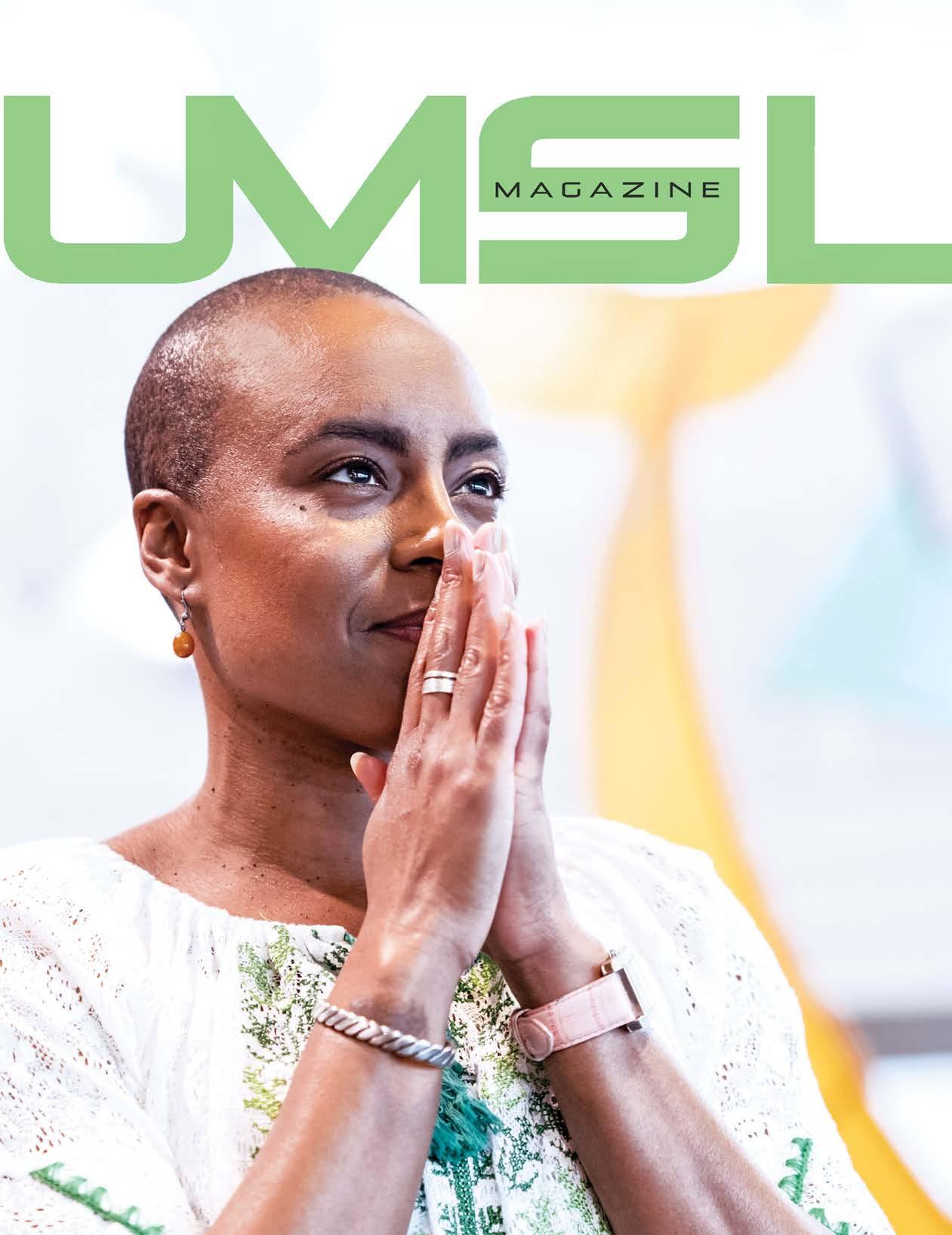
PAGE 28
Building a culture of literacy in St. Louis schools
Page 10
Maria A. Ellis sings her own tune
Page 16
Celebrating 10 years of inclusive education
Page 20
Getting a head start on college courses
Page 25
– A PUBLICATION OF THE UNIVERSITY OF MISSOURI – ST.LOUIS –
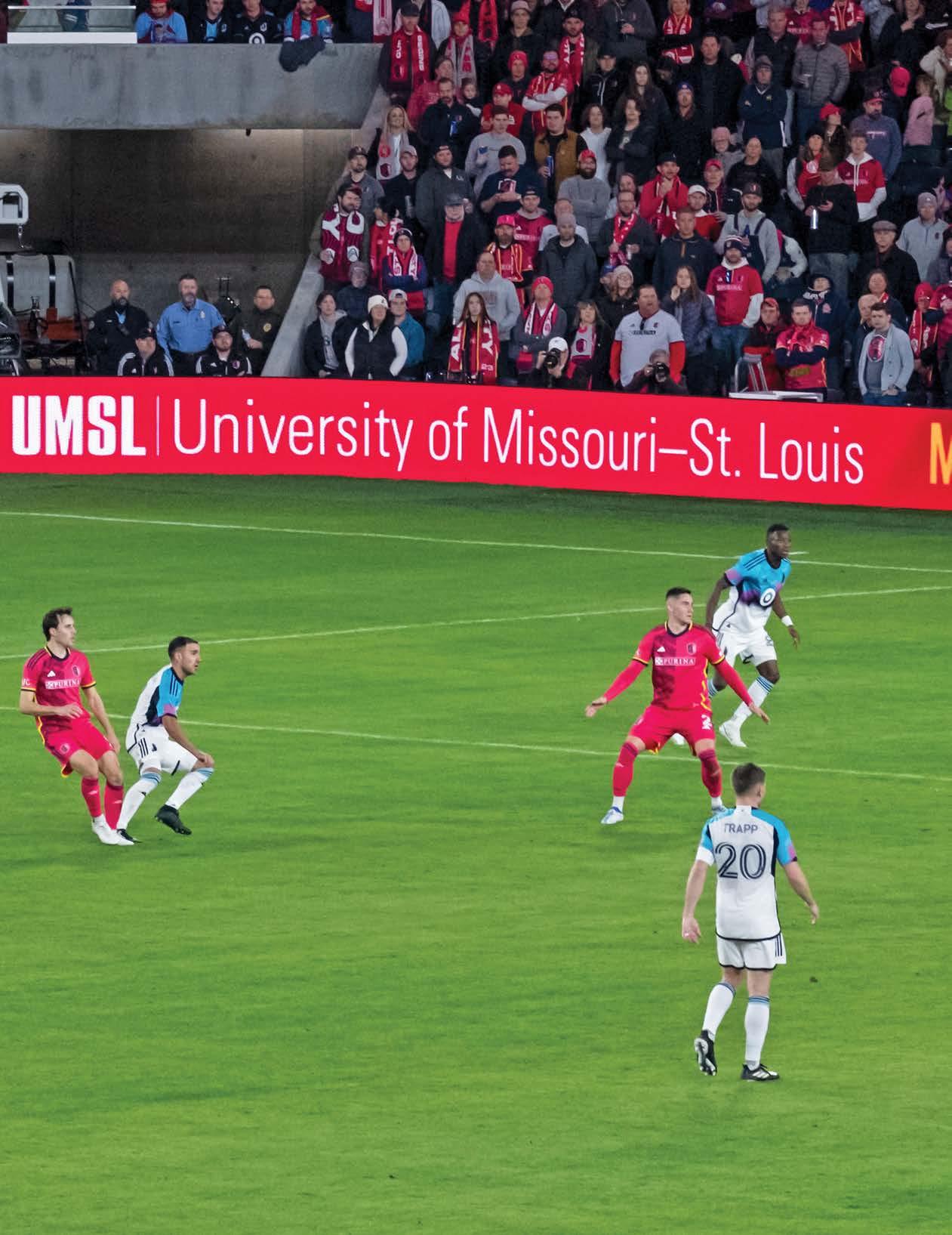

SHUTTER STOP
SHUTTER STOP
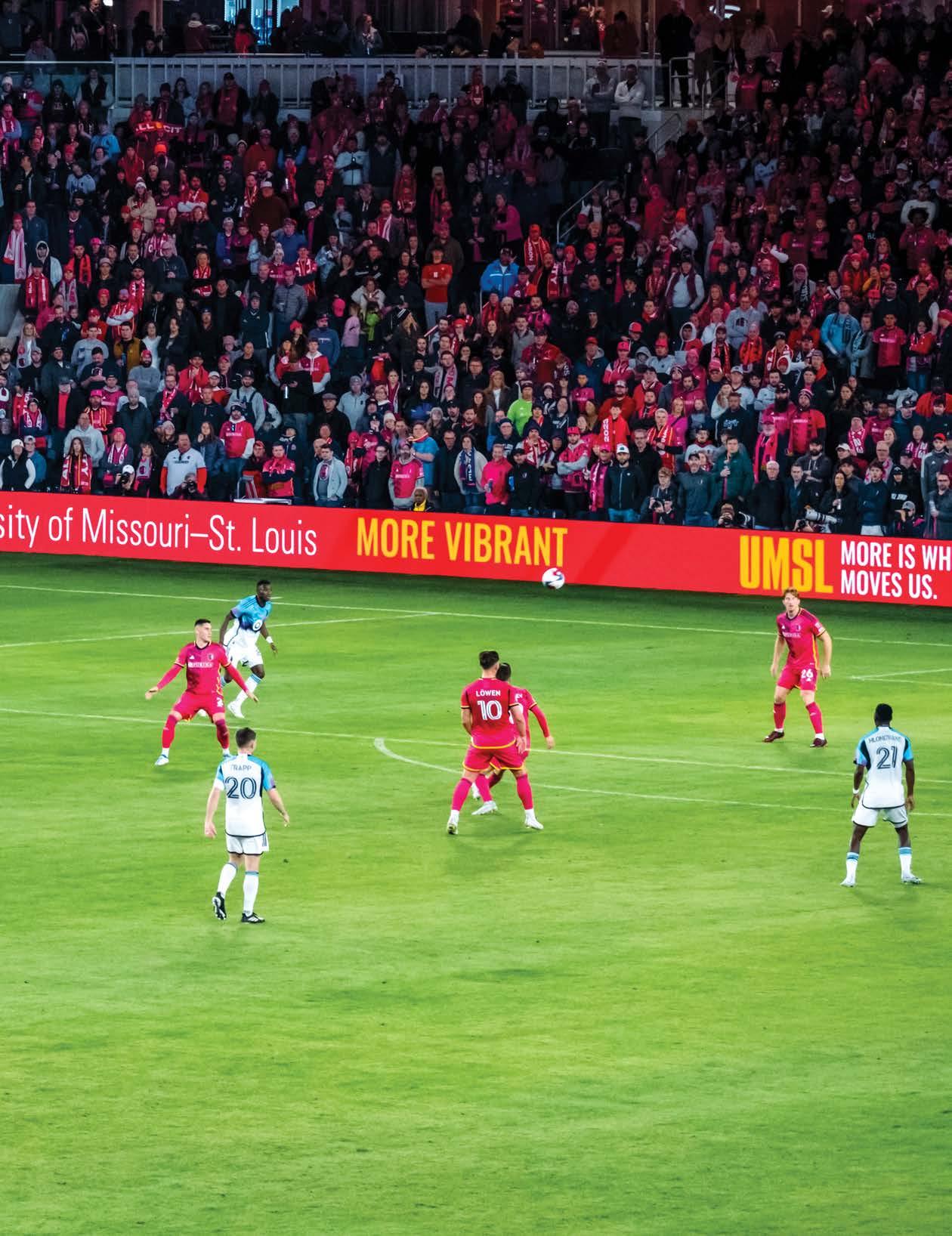
SHUTTER STOP IN THE SPOTLIGHT WHERE T O NEXT
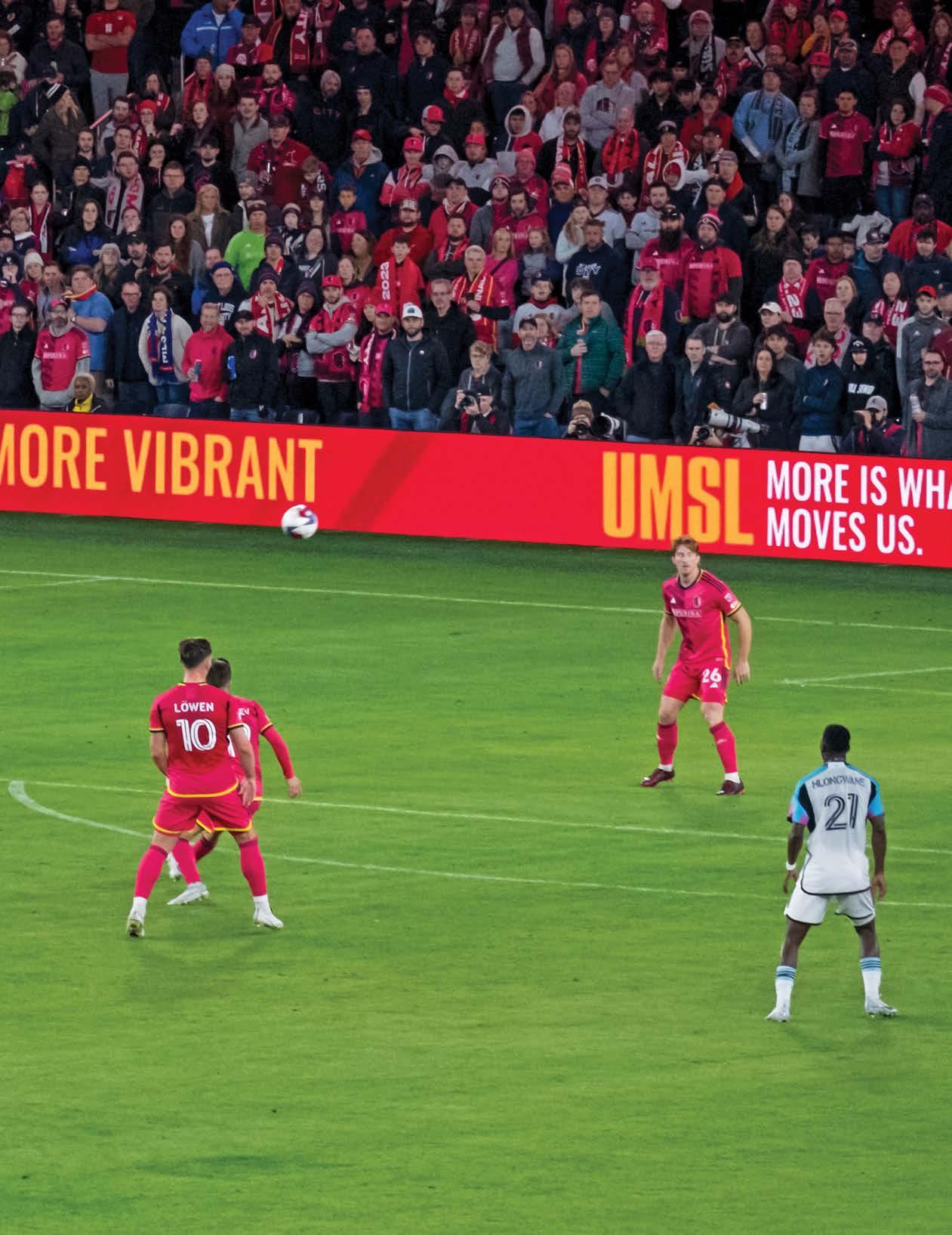
Louis CITY SC faces off against Minnesota United FC at CITYPARK in St. Louis on April 1. UMSL is the official higher education partner of the new expansion team and is working closely with the soccer club to expand the university’s sport management offerings and launch its first-ever competitive esports team. Turn to page 9 for more.
Dynamic Duo St.
TALK O F THE T O WN
SPRING 2023
5............. On Campus
28.......... A Minute With
Israel Collier, humanitarian and nonprofit leader
Cin Lam Mung, cybersecurity major and musician
Adam Presswood, supervisor of stadium tours and museum operations for the St. Louis Cardinals
Kaje Sanford and Javia Gilliam, founders of Pour Decisions STL
32.......... Class Notes
Israel Collier, who earned a BS in biology with a minor in chemistry from UMSL, is passionate about helping those in need. As the founder of ACOPERI, she advocates for Roma minorities in Moldova, providing direct services for the displaced.
Singing
her
own tune
Conductor Maria A. Ellis connects kids with classical music

20
Education for everyone
The Succeed Program celebrates 10 years of transforming lives
25
Getting a head start
UMSL’s Advanced Credit Program expands access to college
Chancellor for Marketing and Communications Justin Roberts
Walentik
Riske
Cavato Burk Krohe
David Morrison
Wendy Todd
Timothy Wombles Director of Creative Services
Traci Moore
Art Director/Designer Wendy Allison Designers
Marty Baragiola
Erin Hart Photographer August Jennewein Printer
Publishing Company
Building a culture of literacy
A $5.1 million grant expands literacy education across St. Louis
The University of Missouri–St. Louis publishes
alumni and friends. The magazine highlights excellence at the university. Circulation is 107,610, and the magazine is released twice a year.
Address
Office
Engagement 414
1
St.
umslalumni.org 314-516-5833
Vice
Director
Updates
of Alumni
Woods Hall
University Blvd.
Louis, MO 63121
Chancellor Kristin Sobolik Associate
of Public Relations and Content/Writer Steve
Editor-in-Chief/ Writer Heather
Writers Joe
Walsworth
UMSL
Office of Marketing and
60 J.C. Penney
1 University
St. Louis,
magazine@umsl.edu umsl.edu/magazine
Magazine
Communications
Building
Blvd.
MO 63121
314-516-5851
for
10
IN
ISSUE IN
THIS
THIS ISSUE ON CAMPUS IN THIS ISSUE 16
Kim Werner
Associate Professor and Associate Dean of Research, College of Nursing
FACULTY Q&A
In addition to her dual role in the College of Nursing, Werner also serves as the principal investigator for Tritons United: Against Gender-Based Violence.
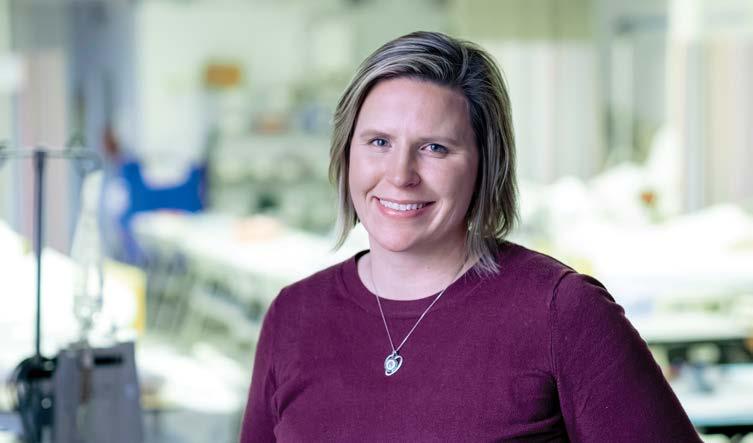
Tell us about your own research interests. I have multiple research interests, and they all focus on women’s health and mental health. My most recent research work examined the biopsychosocial outcomes of trauma in women survivors of domestic violence, including traumatic brain injury, PTSD and quality of life. I graduated with a psychology degree from Saint Louis University in 2006, and that was in the throes of the beginning of Operation Iraqi Freedom, so I really developed a passion for studying and understanding posttraumatic stress disorder, supporting veterans and learning how I can contribute as a civilian. For my graduate work at UMSL, I looked at psychophysiological alterations associated with posttraumatic stress disorder in women survivors of interpersonal violence, including rape and assault. That really changed the thrust of my career and helped me develop my passion for women and women’s health. When I finished my PhD, I did a postdoc at Washington University in St. Louis to look at substance use and substance outcomes associated with trauma exposure. That’s where I developed my psychiatric epidemiology focus to look at how substance use and substance use disorder, as well as other risky behaviors, can be a predominant factor in life trajectory after trauma during childhood.
How do research and clinical practice dovetail in the College of Nursing?
I have learned a lot about the real-world dynamics of being able to improve patient care very quickly by taking the existing evidence that’s in the literature and actually applying it. That’s the linchpin: getting that research that we spend billions of dollars on as a country every year into actual practice and patient outcomes.
Our DNP and PhD students have years – sometimes decades – of practice, and they are clinical experts in important disease states
including oncology, mental health and community health. The synergy of the clinical practice that our students bring, as well as the research expertise and the understanding of research mechanisms and the scientific theory of our faculty, create this perfect petri dish for innovation and novel insight. We’re able to couple faculty expertise and clinical experts together to address real-world problems in real-world time and improve patient care within, say, six months in the hospital settings and institutions where our students are working. That’s really exciting to me, because as a researcher, we often think it takes decades to see any results of what our research projects find to go into practice, and I get to see that on a yearly basis with some of our students.
What’s next for Tritons United?
I rely on the leadership of Project Director Maggie Gross and our Community Coordinated Response Team to drive the future of Tritons United. We’ve been awarded a second round of funding that will carry us through September 2025. One of the thrusts that we’re going to have in the next three years is to support the queer community, including St. Louis Queer+ Support Helpline and LGBTQIA student alliances like PRIZM, as we move forward. We know that the queer community experiences gender-based violence at a much higher rate and we want to make sure that we’re providing programming and support for them specifically. We’re also starting to engage with students from different departments to support the Tritons United project. We have two anthropology students who are taking an elective to support all the programming that we’re doing. We have also had interest from gender studies, psychology and social work, and we’re really open to supporting any interested students. I just love working with students. I love supporting them being able to develop into whatever they want, regardless of what department they’re housed in.
This is
UMSL MAGAZINE 5
“UMSL Radio is so vital.”

Passionate students bring UMSL Radio back to campus
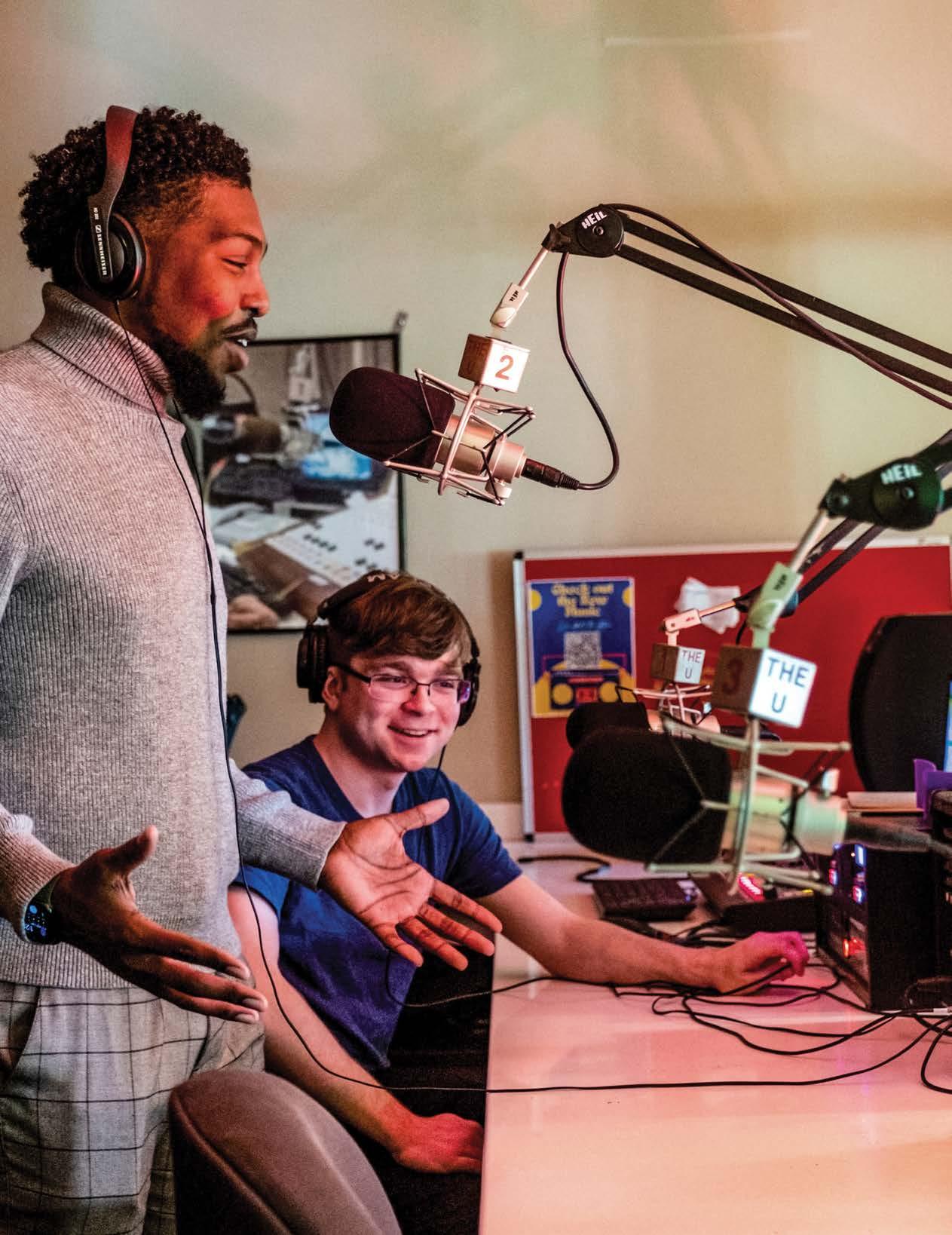
After a two-year hiatus, UMSL Radio is officially back on the airwaves. Last fall, students Aden Adams and Jalen Walker-Wright worked to revive the campus radio station with a diverse mix of programming. The station offers a range of music as well as talk shows that cover news, politics, sports and other topics. In all, 15 students host more than 20 shows, which air Monday through Friday, and members of the UMSL community can tune in live in the MSC and on umslradio.org and the TuneIn app.
“I think it’s important because not only does it give students a way to introduce other people to music that they’ve never heard before, but also being able to tell our students what’s going on at UMSL,” Adams says. “That is so important to me, and to the community in general, having that level of connection.”
“UMSL Radio is so vital,” Walker-Wright adds. “It just gives people a voice. It gives people a chance to be heard and share their opinions, their values, their experiences – everything that makes them them. They have the opportunity to present that.”
Scan codes with your phone’s camera for a deeper look.
– Jalen Walker-Wright
Optometry student Claire Saylor serving as vice president of the American Optometric Student Association
After serving as trustee for UMSL’s chapter of the American Optometric Student Association for the 2022-23 school year – for which she was named Trustee of the Year – optometry student Claire Saylor is taking on even more responsibility with the organization. This spring, Saylor transitioned into the role of vice president of the national organization, the student arm of the American Optometric Association. As vice president, Saylor will
help develop the organization’s vision, guide its priorities over the next year and serve as a more visible face of student representation. While Saylor was drawn to the organization’s advocacy work, she believes it can empower all optometry students regardless of their interests. “Just because I love advocacy doesn’t mean the next person does, but this organization can still encourage students and help them thrive even if they want to go more into research and academia,” she says. “We’re still going to fight for them and encourage them and promote the profession as a whole.”


Students launch Tritons Football Club on campus



Just in time for MLS team St. Louis CITY SC to kick off its first season this spring, a group of UMSL students banded together to launch the Tritons Football Club on campus. The club got its start last year as business major Alexander Orywall, a native of Leverkusen, Germany, began gathering with friends for pickup games at the Recreation and Wellness Center’s indoor soccer field on Friday nights. They soon began hosting watch parties for the 2022 World Cup and in January of this year were officially recognized as an UMSL student organization. The quickly growing club now meets to watch matches featuring premier European teams, attends CITY SC events and hopes to begin competing with other university soccer clubs in the Kansas Missouri Soccer League.
UMSL volleyball, men’s basketball teams celebrate historic seasons
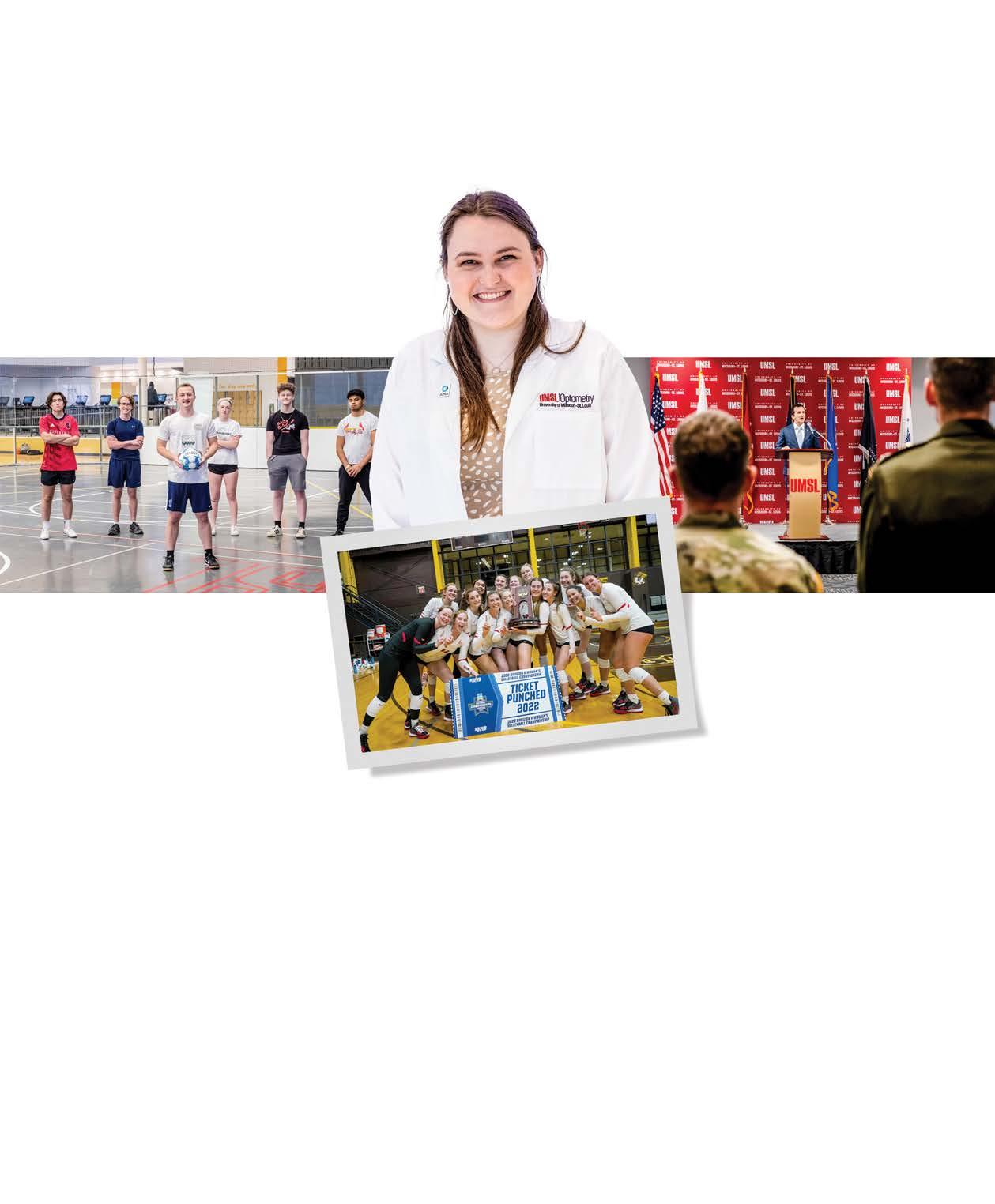
A year after winning its first-ever NCAA Division II Tournament match, the UMSL volleyball team made even more history, storming its way to the Midwest Region title and an appearance in the national semifinals. The Tritons, led by Coach Ryan Young and three-time Great Lakes Valley Conference Player of the Year Charlotte Richards, stunned Barry University in the quarterfinal round before losing to eventual national champion West Texas A&M University in early December in Seattle. The Tritons won 10 straight GLVC matches earlier in the season and won a share of the regular-season title.
The men’s basketball team earned an NCAA Division II Tournament berth for the third time in four seasons and played its way to the Elite Eight for only the second time in school history. UMSL’s last appearance in the national quarterfinals came over 50 years ago in the 1971-72 season. The Tritons beat McKendree to win the Midwest Region title, but their run ended with an 82-75 defeat at the hands of eventual national champion Nova Southeastern, which finished the season 36-0.
Veterans Center celebrates 10 years serving militaryconnected students at UMSL
UMSL’s Veterans Center has provided invaluable service to thousands of military-connected students since its founding in 2012. Last fall, members of the campus community gathered to celebrate the 10th anniversary of the center, which assists veterans as they transition out of service and into academic life by certifying their Veterans Affairs and Department of Defense education benefits. The department works closely with Student Financial Services, Academic Advising and the Office of the Registrar to ensure all requirements are fulfilled, setting them up with other campus resources and creating a welcome place on campus for veterans to connect with each other.
UMSL MAGAZINE 7
APatient Care Center



s we approach the 60th anniversary of the university’s founding, UMSL is setting course toward a renewed and reimagined future that will serve our university, region and far beyond for decades to come.

A dramatic transformation of campus will serve as the foundation for future growth and investments. Construction is currently underway on the second floor of the UMSL Patient Care Center, which will provide the College of Optometry with new teaching labs and offices, plus study and lounge spaces to serve students and faculty. The newly renovated space will allow the college to develop cutting-edge labs that put them in close proximity to the experiences they get in clinical settings. This project is scheduled to be completed in June 2023.
NEW HIRES AND PROMOTIONS BRING FRESH LEADERSHIP TO UMSL
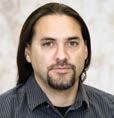
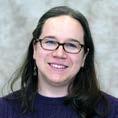

Steven J. Berberich was named vice chancellor for academic affairs and provost in January. Berberich, who had been serving as the university’s interim chief academic officer since September 2021, will now hold the position on a permanent basis. Berberich has already made an impact during his time at UMSL, including restructuring the academic affairs office, collaborating with the Office of Human Resources to launch an Emerging Leaders Program for faculty and staff, creating a process for tenured faculty members to take sabbatical leaves and leading several successful job searches.
Reda Amer was named the new director of UMSL’s Geospatial Collaborative in February Amer, who most recently served as an assistant professor in the Department of Earth and Space Sciences at Lamar University and the director of its Geospatial Center in Beaumont, Texas, will guide the collaborative as it works to strengthen its connections to St. Louis’ blossoming geospatial sector and take a leading role in building the future workforce.
Associate Professors Aimee Dunlap and Nathan Muchhala were named interim co-directors of the Whitney R. Harris World Ecology Center. The pair plan to preserve the legacy of the Harris Center while also implementing new ideas and events, reconnecting with alumni, growing undergraduate research and working to hire a full-time director of the center.
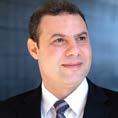 From top: Steven J. Berberich, Reda Amer, Aimee Dunlap and Nathan Muchhala
From top: Steven J. Berberich, Reda Amer, Aimee Dunlap and Nathan Muchhala
SPRING 2023 8
Transforming UMSL
Sandra Langeslag’s research on love and the brain featured on TODAY



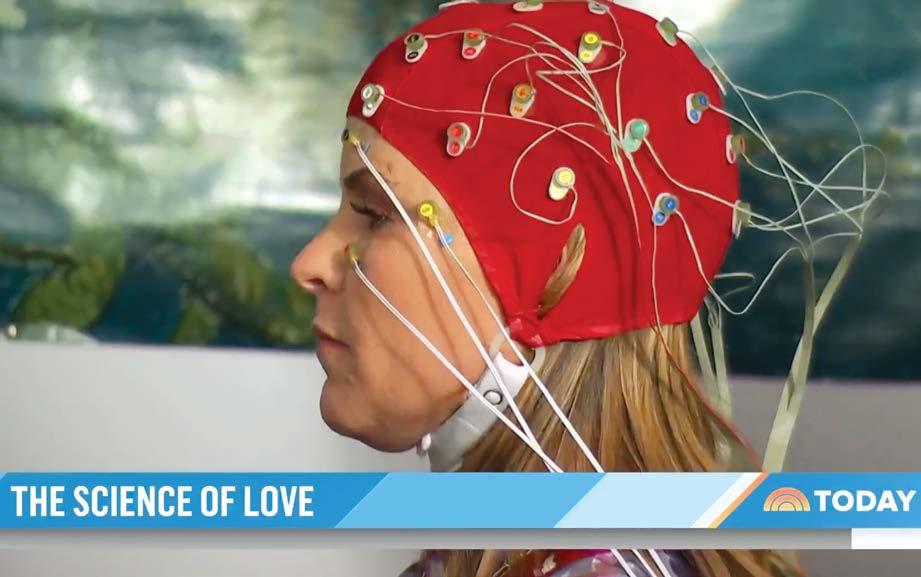
In February, TODAY show host Jenna Bush Hager paid a visit to UMSL to speak to Associate Professor Sandra Langeslag about her research on the science underlying feelings of love and devotion for a Valentine’s Day-themed segment. A faculty member in the Department of Psychological Sciences, Langeslag has been studying the relationship between love and the brain for nearly 20 years. For the segment, Langeslag fitted Bush Hager with an electrode cap for an electroencephalogram – or EEG – which monitors and measures electrical activity in the brain. She then monitored how the host responded after being exposed to a variety of images, one second at a time, over six minutes. The pictures Bush Hager saw were of her husband, her friend and colleague Al Roker, her cat and a stranger, which provided a baseline for the test. Langeslag and Bush Hager sat together and went over the results, analyzing four colored lines on a computer screen.
UMSL is joining forces with St. Louis CITY SC to grow the next generation of esports players and fans and unite the two brands in programming designed to foster professional development by expanding UMSL’s sport management offerings. This fall, UMSL will launch its first competitive esports team. The extracurricular student experience is tailored to students and prospective students who are talented esports players and
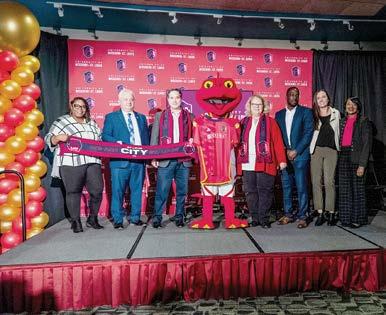
UMSL RECEIVES CORPORATE DIVERSITY AWARD FROM ST. LOUIS AMERICAN
is designed to engage students in academic programs such as computer science, engineering, information systems, art and graphic design, and business-related programs. UMSL will also serve as the presenting partner of the St. Louis CITY SC Esports Program, which includes esports and gaming integration through dedicated events on and off campus, content and externship opportunities for UMSL students.
In February, the St. Louis American Foundation honored UMSL for its impact – spanning six decades – by presenting it with its 2023 Corporate Diversity Award. The St. Louis American made special note of initiatives such as the UMSL Bridge Program, which has delivered comprehensive educational access programming to thousands of students and parents in the St. Louis region and beyond since 1986, and the Diversity, Equity and Inclusion Accelerator, which aids new and diverse entrepreneurs by providing them with $50,000 in non-dilutive capital as well as access to business training and a team of UMSL interns to help grow their businesses. “It’s a corporate diversity award that illustrates our entire mission – which is to transform lives,” UMSL Chancellor Kristin Sobolik said in a story in The St. Louis American announcing the honor. “We are an anchor institution here in St. Louis. So being recognized for everything that all of us are working hard and doing from a very diverse and inclusive perspective out in the broader St. Louis community – that is what I am excited about.”
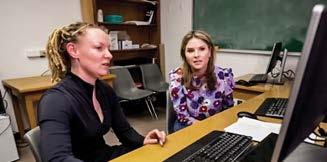
UMSL MAGAZINE 9
ST. LOUIS CITY SC PARTNERS WITH UMSL ON ESPORTS AND PROFESSIONAL DEVELOPMENT EDUCATION INITIATIVES
Teachers


TEACHING Teachers
With the help of a $5.1 million grant, a team of literacy experts at UMSL is supporting teachers across the St. Louis area as they build a culture of literacy in their schools.
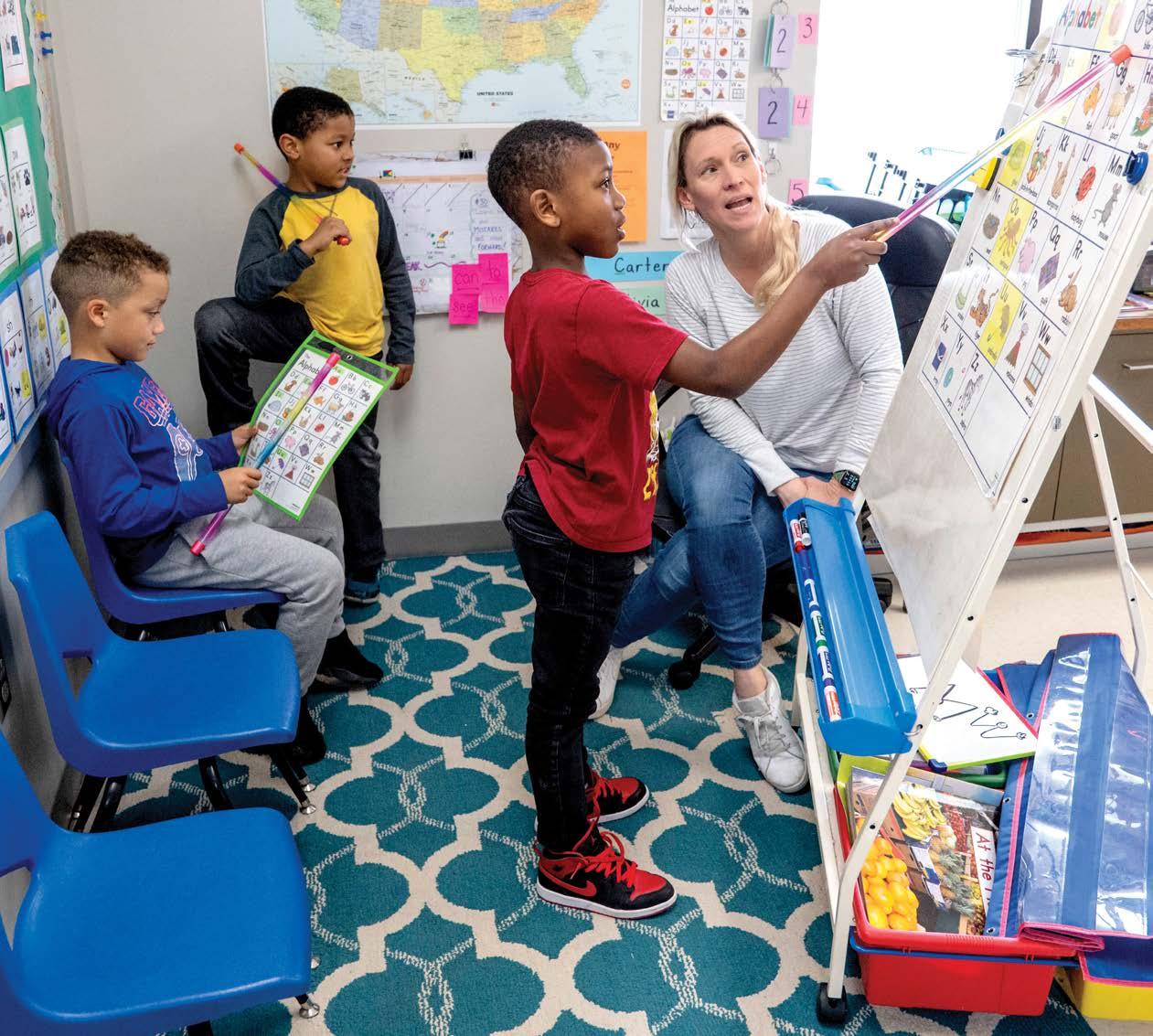 By Heather Riske
By Heather Riske

u
Each day of the school week, Greenville Elementary teacher Kathryn Inman grabs a timer and gives her fifth-grade classroom a writing prompt: a song, perhaps, or maybe a poem or another piece of writing. She sets the timer for six minutes, puts on a little background music and lets them scribble away.
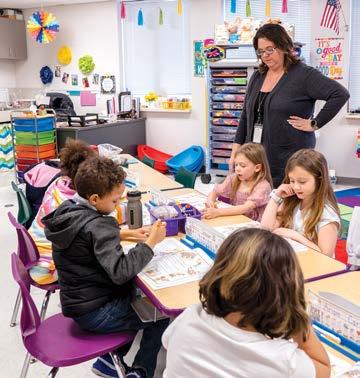
“I’ve never had a class that has started loving writing more than my class this year,” she says. “They just love these little writing prompts, and then they get to share out. In past years, there’d only be a few that would want to share. Now, my whole class wants to share every day.”



Those daily quick writes are just one literacy strategy Inman has implemented in her classroom through what she’s learned in the Gateway Writing Project’s Writing Institute, held on campus at the University of Missouri–St. Louis. A self-described lifelong learner, Inman took advantage of the opportunity to enroll in the institute’s new monthly program and pursue a master’s of education with an emphasis in reading through the Missouri Department of Elementary and Secondary Education’s Comprehensive Literacy State Development program. She says what she’s learned so far is already having a direct impact on the kids in her classroom.
“This is my first year implementing these types of strategies into my writing instruction, and I see a complete difference in how much the kids actually love writing and feel confident in their writing,” she says. “At the beginning of the year, I would say more than half of them were two or more grade levels below when it came to the ELA portion. That daily quick write and all these other strategies for active engagement really get them wanting to be there and wanting to write.”
***
In August 2020, Missouri DESE was awarded an $18 million grant for its CLSD program, which is designed to provide support and outreach in literacy education to students, educators and families in underserved areas throughout the state. To carry out the work of the grant, DESE contracted the Missouri Reading Initiative and the Show Me Literacies Collaborative, which includes literacy experts from the Missouri Writing Project Network (featuring three sites housed at UMSL, University of Missouri-Columbia and University of Central Missouri) and the Missouri Language and Literacies Center. Collectively, the collaborative is working with dozens of schools across the state of Missouri on reading, writing and inquiry.
The team at UMSL, led by co-principal investigators Shea Kerkhoff, assistant professor of literacy; Katie O’Daniels, assistant teaching professor of literacy and co-director of the Gateway Writing Project; and Nancy Singer, associate dean of the College of Education and an associate professor of English education, secured $5.1 million of the grant money to provide these services in the St. Louis region over five years.
“Given the opportunity gaps that exist when examining any national or statewide data and the ways in which existing racial and socioeconomic disparities were exacerbated with COVID, we believe that ensuring that all children are competent and confident readers, writers and thinkers – through educational practices that not only honor but sustain cultural and linguistic diversity – is a key civil rights issue for us to collectively address in these current times and with this generation of children,” O’Daniels says. “There’s an urgency to it.”
“Literacy is really important because it is related to life outcome,” Kerkhoff adds. “We know Teachers at Hancock Elementary School are implementing new literacy strategies with the help of grant funding. Reading Specialist and National Board Certified Teacher Cheryl Calcaterra reviews letter sounds with students (opposite page) and Maria Krausz, who receives a tuition grant from UMSL, works on reading new vocabulary words in sentences with first grade students.
that children who can read fluently, comprehend and write fluently, creatively and critically have better chances for the kind of life that they want. They have self-actualization, meaning they can make the choices that they want to make in life. It’s super important, and it’s super important that all children are able to have that kind of life that they want. We saw that not all children in Missouri are at proficiency, and that’s what this grant is all about. The grant funding is helping us serve schools.”
In addition to Kerkhoff, O’Daniels and Singer, the grant allowed UMSL to expand its full-time team to carry out this work. Tracy Brosch, who also serves as co-director of the Gateway Writing Project, and Diana Hammond, assistant director of professional learning, are grant coordinators, and the team also includes several graduate research assistants.
UMSL specifically is working with 38 schools – and reaching approximately 35,000 children – in the St. Louis region, which includes metropolitan St. Louis as well as the Greenville, Potosi a nd Williamsville areas. As nearly any member of the team will tell you, 40 schools is a considerable number, and each of those schools has unique needs. Due to the pandemic, t he first year of the grant was largely spent over Zoom, which the team used as an opportunity to get to know the teachers and administrative leadership in the participating schools and build trust with them.
“I think one of the things that makes this grant different is that we really spent a lot of time in the first year or so doing a needs and assets conversation with the schools to develop their own literacy action plan,” Singer says. “The schools vary widely: We are working with most of the Normandy schools, but then we also have schools out in St. Charles County and schools in rural Missouri. This wasn’t us coming in and saying, ‘Everybody needs to do this one thing and then you’ll have great readers and writers in your school.’ But rather trying to understand the local context of schools – what kind of learners they have and what challenges they face – and trying to tailor what they needed in that action plan.”
As they hosted meetings and discussions with each of the schools and sent out surveys, four main themes started to emerge from an evaluation of needs and assets that have guided much of the work of the project. Teachers were eager to meet their schools’ needs for more culturally responsive texts and materials; expanded literacy across different disciplines such
as history and mathematics; expanded family and community literacy; and ongoing professional learning on literacy. The team also worked with each school to develop a unique literacy action plan for taking what they’ve learned through this programming and putting it into action in their classrooms.
***
After the initial launch in the summer of 2021, the UMSL team has continued to expand its work each year. This year, they began offering three “pathways” for professional learning, all hosted on the UMSL campus throughout the year. The pathways demonstrate an expansive view of literacy, including reading and writing as well as speaking and listening, visual representation and creative, critical and computational thinking.
The literacy leadership pathway was designed to support those involved in the initial development of the literacy action plan and help them implement those plans, which vary widely across schools. One elementary school sought to make literacy more fun for students, so they built hallway libraries for kids to grab a book while waiting in line for the bathroom and started hosting dress-up days for beloved book characters. One middle school began planning a community literacy night, while another diversified its libraries with more culturally responsive books. A high school that wanted to grow literacy started its own book club.
A second pathway, in coordination with the National Writing Project, focuses on source-based argumentation within different content areas such as ELA, science and social studies in grades 4 through 12. The program pulls from the National Writing Project’s College, Career and Community Writers Program (C3WP), a professional development program that provides teachers with resources and tools for the teaching of evidencebased argument writing. The program is hosted online, but the UMSL team also meets with teachers throughout the year to extend that work and connect as a group.
“We’re supporting teachers with inquiry-based reading and source-based writing and thinking about the need to understand the sources and talk back to them,” Hammond says. “How do they interact in form, shape or thinking as we have them in conversation with one another? We’re also ultimately looking at how they’re positioned in our society – what topics are relevant and urgent for us to investigate together in our community, whether the school community or a wider St. Louis community or statewide?”
The third pathway is an extension of the Summer Writing Institute that has been offered through the Gateway Writing Project since

“Literacy is really important because it is related to life outcome. We know that children who can read fluently, comprehend and write fluently, creatively and critically have better chances for the kind of life that they want.”
SHEA KERKHOFF
1978. Offered at all National Writing Project sites, the intensive learning opportunity engages teachers of all subjects and grade levels in the pedagogy and practice of writing and is traditionally held Monday through Friday over four weeks in the summer. This year, in addition to hosting the traditional summer program, the team is piloting a yearlong Writing Institute to make it more accessible to teachers like Inman. Teachers can choose from a yearlong weekly evening class or a yearlong monthly full-day program with a three-day launch in August.
“It kind of seemed like the summer numbers were dwindling just because teachers are burned out and they need time off,” Brosch says. “It’s a full-day course, it’s four weeks – it’s a lot. So, with the support of the grant, we’ve been playing with other a lternatives and thinking about what that looks like. How do we reach teachers in the way they want to be reached?”


Th at thought has been a guiding principle for the team as they seek to make these offerings accessible to all teachers.
While the pathways bring teachers to the UMSL campus, the team also goes directly to the schools to offer professional development workshops. This year’s workshops sought to address the priority goals developed during the literacy action planning, including source-based argumentation and inquiry, helping student writers grow through feedback and support and building a school culture of literacy, which O’Daniels says h as proved most popular.
“That’s been really well-received by schools because it’s kind of a starting point for moving the needle and really having that all-hands-ondeck mentality, but also thinking about literacy as something to be celebrated, something that’s joyful,” she says. “Because that brings our kids in; when they’re experiencing joy and being celebrated, that brings them to the table, that gets them on board.”
In addition to professional development offered both in schools and on the UMSL campus, the team has built a virtual professional learning community, the Show Me Literacies Community, which is hosted on the Participate platform. The community is free for all Missouri educators to join and features research-based resources on popular topics such as word study, motivation and engagement. Teachers can also participate in “pop-up PD,” which are two-week online courses that are slightly more structured and community-based. Soon, teachers will be able to receive digital badges for completing the courses.
“ We have lots of opportunities for teachers to get involved with our network in kind of lowkey ways,” O’Daniels says, “but we also have opportunities for teachers to get involved
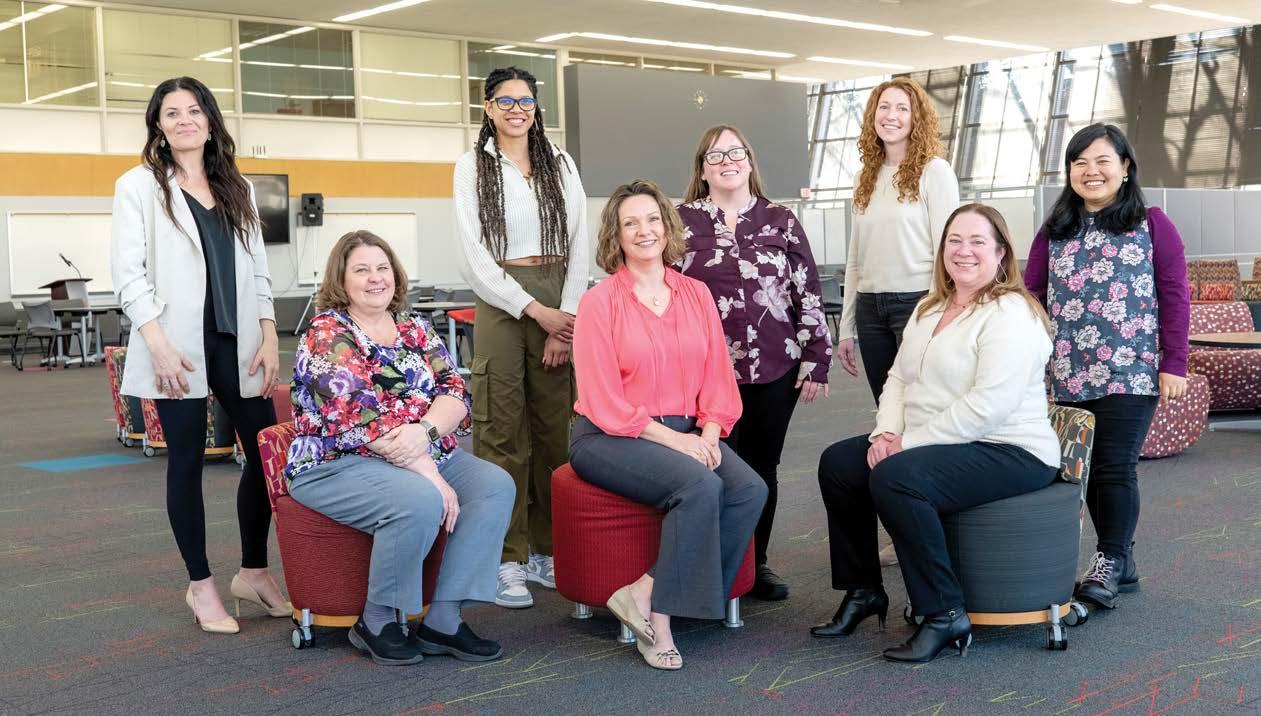
***
a
The St. Louis region team consists of (from left to right) Leslie Hamm, Nancy Singer, Jasmin Easterling, Shea Kerkhoff, Tracy Brosch, Diana Hammond, Katie O'Daniels and Astri Napitupulu.
in more sustained ways that lead to teacher leadership and opportunities to work with other teachers in the region on professional development activities, study groups, conference presentations. We just want to be a professional support network for teachers because we know that teaching is hard and the teaching of literacy is complex.”
***
A s in Inman’s case, the grant also supports continued learning for teachers in the form of tuition dollars. Each participating school receives $6,000 a year for tuition for any teacher in the school that can be used toward a graduate certificate in writing, K-12 certification in reading or other literacy instruction-related courses. So far, the grant has helped 49 graduate students enroll in literacy programs at UMSL, generating $148,259 in tuition for the College of Education. Schools also receive $800 each year to enact the goals of their literacy plans, whether for materials for students or stipends for teachers to work on those plans. On top of that, the grant provides additional tuition and stipends for teachers participating in the various pathways, such as the Writing Institute, “Summer Launch” professional development days or the upcoming Literacy Leadership Academy.

I n the remaining years of the grant, the team plans to continue supporting the implementation of those literacy plans, facilitating ongoing professional learning through the pathways and providing responsive school-site professional learning. This coming year, they will pilot a Literacy Leadership Academy, which will build on the work of the leadership pathway with more one-on-one professional development offered monthly.
“This is really in response to the needs of educators to be understanding and thinking about the science of reading and the evidence base around literacy teaching and learning,” O’Daniels says. “Literacy Leadership Academy is designed to start taking an inquiry-based focus on the research around literacy teaching and learning and using that type of space to bridge research and practice.”
Building a community of practice – in essence, a group that wants to learn and grow together – is a key tenet of the Gateway Writing Project and a major objective of the grant team. O’Daniels and Singer joke that they’ve done their job well when they’ve worked themselves out of a job by giving schools and teachers the tools they need to facilitate these professional development initiatives on their own. At the heart of the project is a deep-seated desire to use evidence-based research and practices to empower and encourage educators across the state.
“We don’t think that we have the magic pill or silver bullet that’s just going to – poof – all children everywhere in Missouri are now going to be at grade level,” Kerkhoff says. “But we do have hope that we can leverage evidence-based practices and share teacher knowledge with each other in ways that make teachers feel appreciated and valued, and that they would have the knowledge and support to have confidence in what they’re doing. And that would cascade down to the children, who would also have confidence that they can learn to read and comprehend and write well. I can’t measure that with a standardized test, but that’s what success looks like to me.”

14 SPRING 2023
Shea Kerkhoff chats with educators at a Literacy Leaders Regroup on the UMSL campus in February. The event provided professional development on leading change and implementation science for the literacy teams to prepare for implementing their literacy action plans.
“We just want to be a professional support network for teachers because we know that teaching is hard and the teaching of literacy is complex.”
– KATIE O’DANIELS
Total Appropriation
$ 190m Missouri DESE
Appropriation
$ 18m
St. Louis Region
Appropriation $5.1m
facilitated by UMSL
78
11 States Awarded Missouri DESE Schools
Participating
38
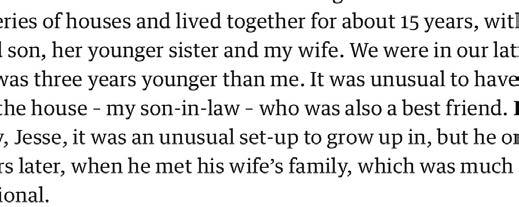
St. Louis Region Schools
Participating
THE COMPREHENSIVE LITERACY STATE DEVELOPMENT DISCRETIONARY GRANTS are designed to create a comprehensive literacy program to advance literacy skills, including pre-literacy skills, reading and writing, for children from birth through grade 12, with an emphasis on disadvantaged children, including children living in poverty, English learners and children with disabilities.


15 UMSL MAGAZINE
c
CLSD aWARDS 2020
From the church choir to CarnegieHall
Conductor Maria A. Ellis offers her own brand of music education
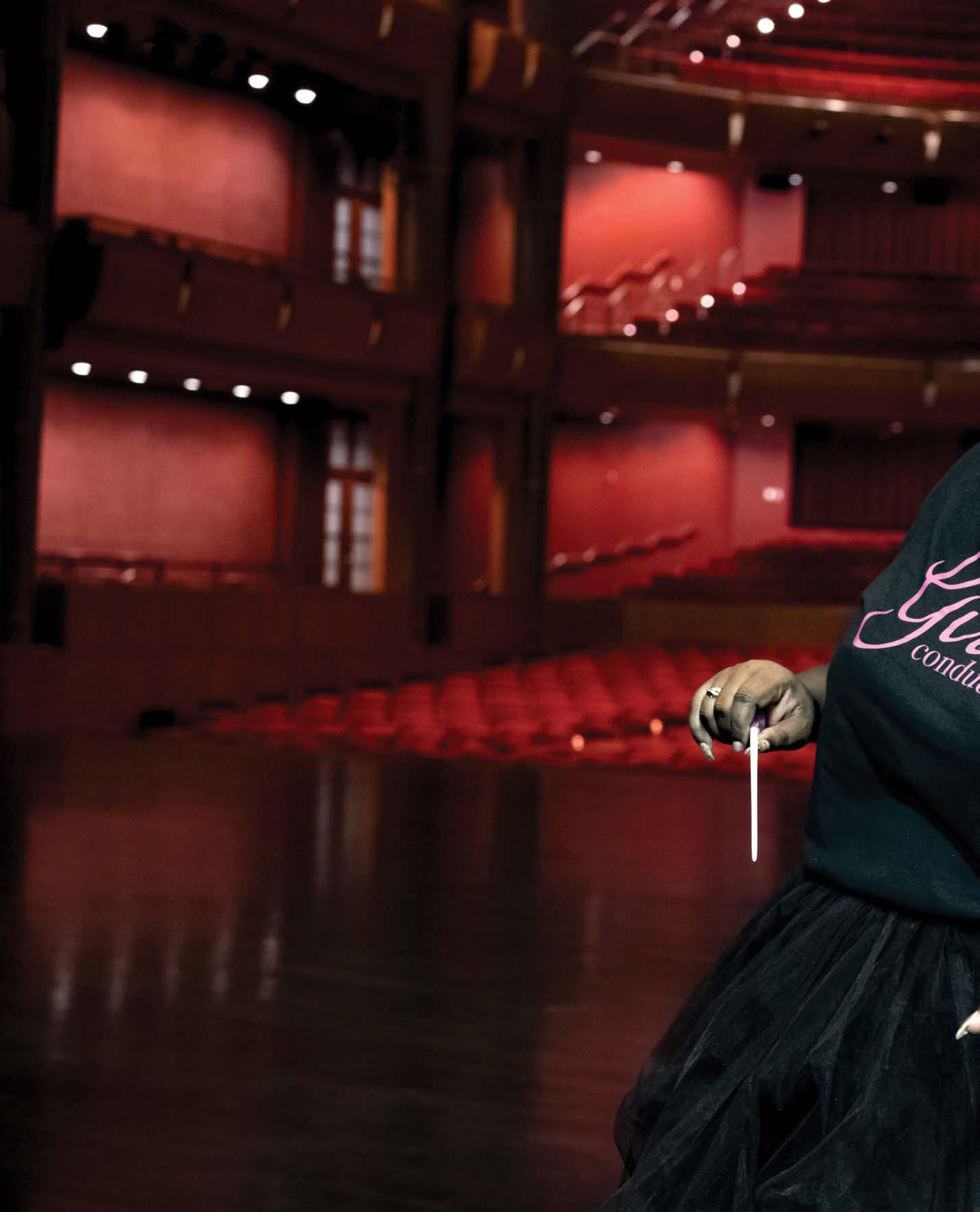
who happens to step foot inside The Sheldon Concert Hall on a Monday night may just hear “Super Duper Double Bubble Gum” wafting through the halls. That would be conductor Maria A. Ellis leading the All-Star Chorus, the concert hall’s youth choir, through its warm-up for its rehearsal. As she snaps her fingers, claps and bounces to keep the beat, she also keeps the chorus on pitch and on point when singing selections such as Mozart’s “Lacrimosa” and “Silver and Gold” by Kirk Franklin. Ellis travels the country conducting and teaching choirs and providing voice lessons, helping singers tap into their potential and enhance their talent. She also provides professional development workshops for music teachers. With her students, she teaches that each song has a character and has them think about the intent of the composer and what the lyrics mean. When teaching spiritual selections, she encourages them to think about what the lyrics could mean today.
The St. Louis native grew up around music with two parents she refers to as amateur musicians. Her father and his siblings had a choir, The Chapman Singers, and as a kid, Ellis followed them around, mimicking their voices and learning how to sing the soprano, alto and tenor parts.
This informal introduction to music direction ignited her passion for conducting. At 12 years old, she became the conductor for her church’s youth chorus. Later, in high school, she sought support to continue her musical ambitions.
“I asked my high school teacher to put me on a path to conduct music full-time,” Ellis says. “And she told me, ‘Well, you can be a choir teacher.’ And that’s it. She said I could be a music teacher. And I said I didn’t want to. I didn’t want to teach music in a classroom. I never wanted to do that. I’m a free spirit and don’t want to be locked into one spot. So I pursued business and worked for AT&T. And then, in 2012, my pastor asked me to revamp our children’s choir.”
By Wendy Todd
ff
Anyone
But in order to take her ambitions of conducting further, she needed to know music theory. So Ellis decided to go back to school and get a BM in music education at the University of Missouri–St. Louis, with an emphasis in voice. Music theory wasn’t easy, but she found a way to understand.
“It is difficult, but we learn,” Ellis says. “I struggled really bad because it was like I was learning a new language. Everything was given to me via the lens of Western classical music. But when I was able to interpret that into music I knew, like gospel and hip-hop, then it wasn’t as hard. I just had to do it in my language.”
Ellis, who is pursuing her master’s in music at Webster University, continues to use music she feels is more relatable, like Beyoncé, as a music educator, traveling across the country conducting clinics with choirs and music groups via her company, Girl Conductor.
“One of the things I show is that you can teach music with a variety of genres,” she explains. “I can use the Farmers Insurance commercial,” she says, singing “We are Farmers, bum ba dum bum bum bum bum.” “I can teach music theory from that. I can teach you how to sight read that. I don’t use ‘Here Comes the Bride’ or ‘Auld Lang Syne’ because for my culture, I can’t tell you the first or the last time I’ve been to a wedding where the bride came down the aisle to that song. Those songs are not prevalent in my culture. So I want to use music kids listen to now and teach from that. That way we really can say we teach this universal language of music.”
Ellis created Girl Conductor not only to have her own music education business but also as a means to infuse the conducting arena with more diversity, particularly regarding women of color, whom Ellis didn’t see in that space until 2020.

UMSL MAGAZINE 17
Along with traveling the country offering music education, Ellis is also the founding director of the All-Star Youth Chorus at The Sheldon, currently conducting and teaching 23 students from 15 high schools across St. Louis. In June, she will be conducting 22 of the student performers along with 78 other singers from various choruses from around the country at Carnegie Hall.
“We will be doing a work called ‘Gospel Mass’ by Robert Ray,” she says. “I wanted to feature St. Louis in this performance. Ray was a professor at UMSL, and he composed the first gospel mass. I am nervous as this will be my first time conducting orchestra, but I am getting lots of help from my former UMSL professors and will be working with Dave Wacyk, UMSL’s director of instrumental ensembles, on some orchestral conducting techniques.”
Laurel Wacyk, who is director of education at The Sheldon and married to Dave, has observed Ellis’ enthusiasm for her work and helping her students reach their highest level of talent.
“Maria is highly motivated to offer student singers in St. Louis opportunities she never had,” Laurel says. “When you talk to her about her passion for this, you can feel it coming out of her bones. Because she wants to give them the best, she holds all her students to a high standard and celebrates when they rise to it. She is a team-builder and advocate.”
In addition to her knowledge, it is Ellis’ personal blend of energy, humility and gratitude that make her a standout leader as a music educator.
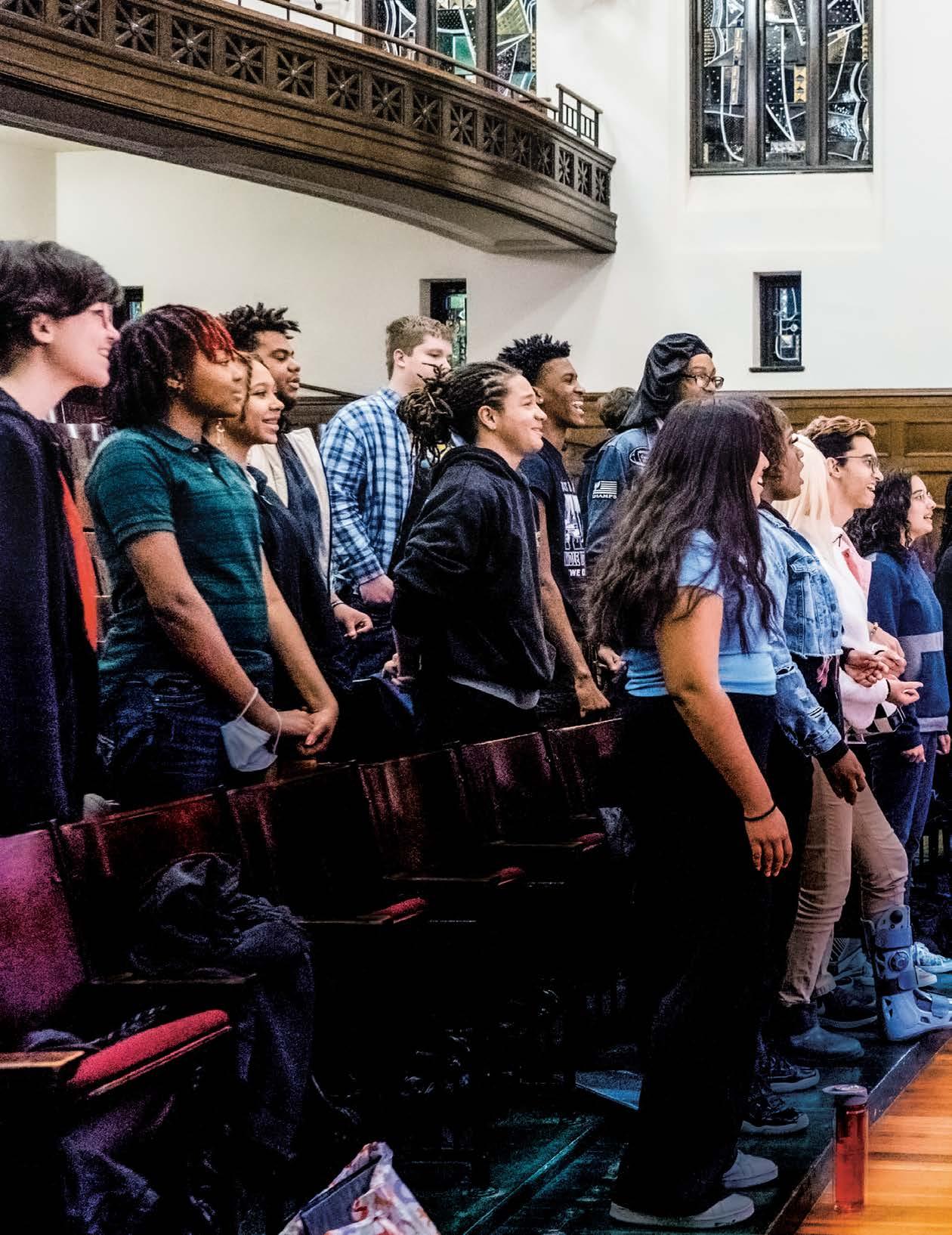
“Maria is a creative force,” Laurel says emphatically. “She generates vision for the program and is the momentum. What people who don’t know her personally may not realize is she is also gracious and humble. Even with the national name recognition she now holds in music education circles, Maria is eager to learn, quick to say ‘thank you’ and acknowledges the efforts of others in shared success.”
“I love working with young people,” Ellis adds.“They are so eager to learn and willing to try whatever method I give them. They trust me. I feel like a proud auntie watching her nieces and nephews grow.”
Coupled with her hard work, Ellis’ success can also be attributed to the support she’s received, from getting the opportunity to conduct her church choir as a kid to her time studying music at UMSL and receiving not only an education but a support system that’s made her feel included.
“I feel like UMSL is home,” she says. “I feel very welcomed. All of my teacher friends are at UMSL, and that’s home, so I love being connected to home.”
SPRING 2023 16
Maria A. Ellis leads The Sheldon’s All-Star Chorus through a rehearsal at the concert hall in Grand Center.
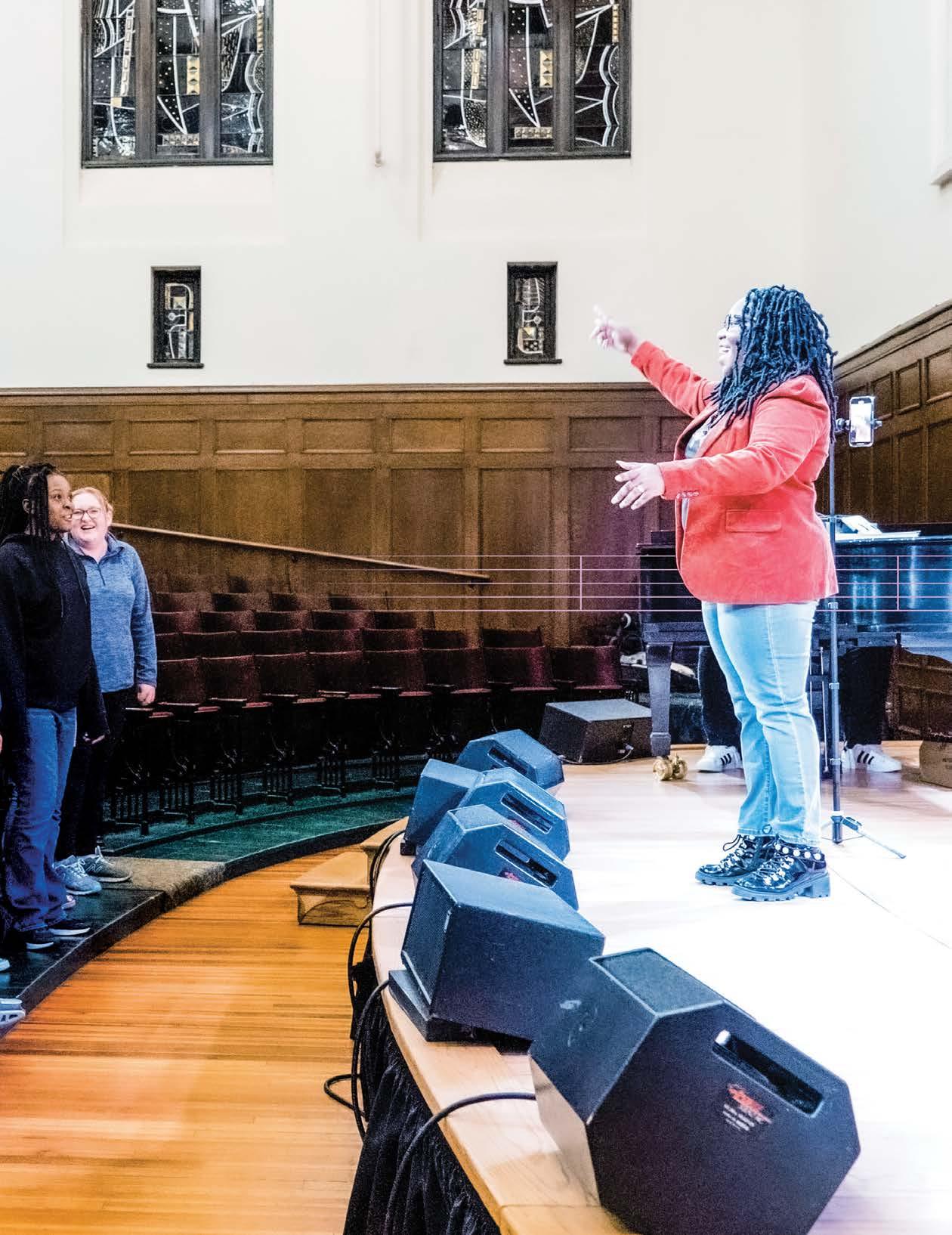
UMSL MAGAZINE 19
“I love working with young people. They are so eager to learn and willing to try whatever method I give them.”
– Maria A. Ellis
A Trailblazer in Inclusive Education
UMSL’s Succeed Program celebrates 10 years transforming lives
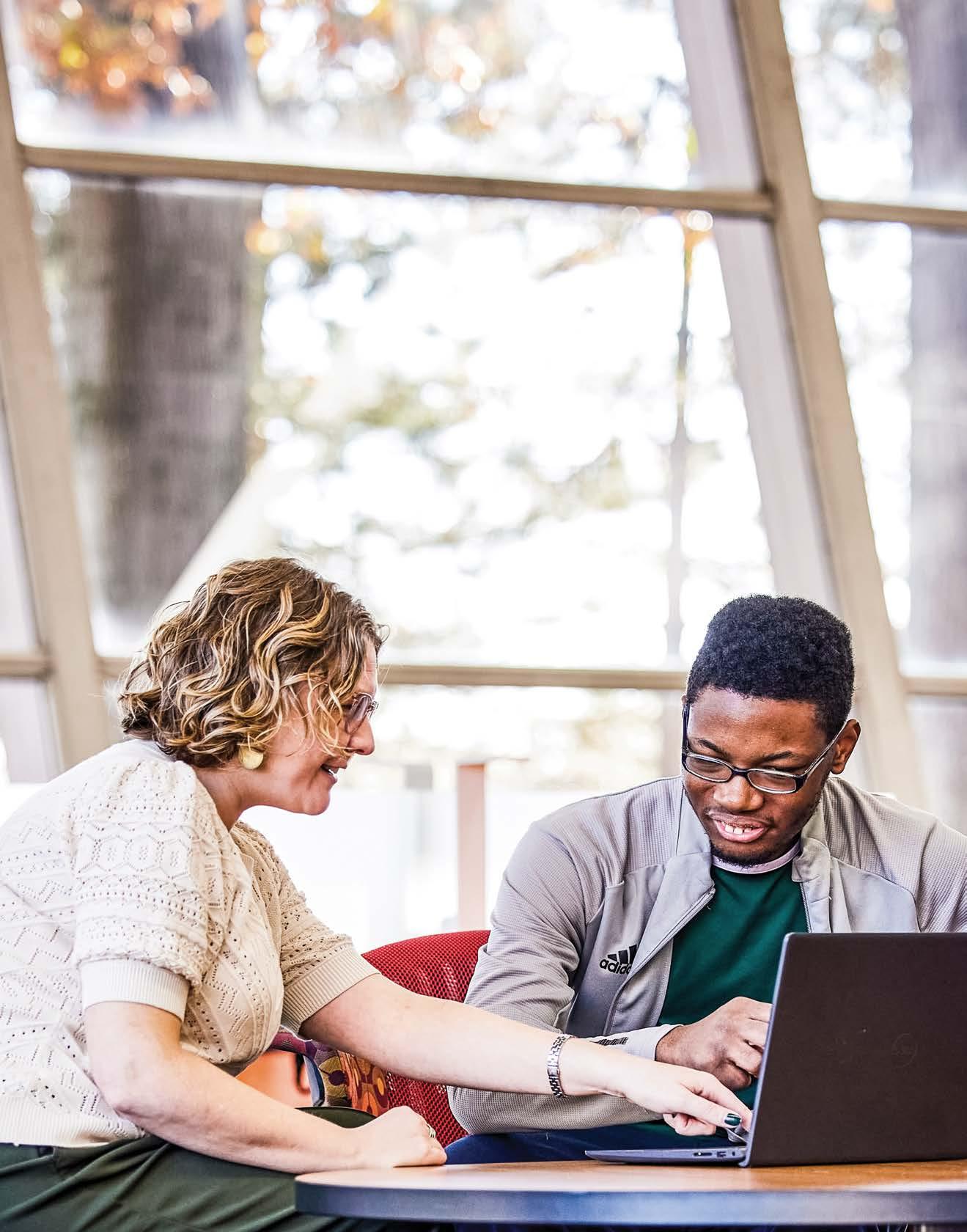 By Burk Krohe
By Burk Krohe

Over the course of its 10 years at UMSL, the Succeed Program has helped transform the lives of over 150 students such as Jaylin Brown, pictured here with Volunteer and Internship Coordinator Heather Cowan.
ANDREW HOLMAN HAS ALWAYS ASPIRED TO EARN A BACHELOR’S DEGREE, DREAMING OF HELPING AND TEACHING OTHERS. HISTORICALLY, PATHS TO THAT GOAL HAVE BEEN LIMITED FOR STUDENTS LIKE HOLMAN, WHO HAVE INTELLECTUAL AND DEVELOPMENTAL DISABILITIES, BUT THE SUCCEED PROGRAM AT THE UNIVERSITY OF MISSOURI–ST. LOUIS HAS WORKED TIRELESSLY OVER THE PAST DECADE TO CHANGE THAT.
Since its founding in 2013, the postsecondary education program has provided opportunities for UMSL students with intellectual and developmental disabilities to develop academic, living and vocational skills as they work toward a two-year Chancellor’s Certificate or potentially matriculate to a degree program.
Holman is one of more than 150 students to benefit from Succeed over the years, and he’s also pushed the bounds of the program forward. This month, he will graduate from the College of Education with a Bachelor of Educational Studies, realizing his dream and becoming one of the first Succeed alumni to earn an undergraduate degree
“Succeed only enhanced that feeling of, ‘Hey, this is achievable; I can do this,’” Holman says. He isn’t alone in his success. Fellow Succeed alumnus Finn Nardi-Warner will join Holman at commencement, having also earned a BES. Their accomplishments exemplify the Succeed Program’s evolution as it celebrates its 10th anniversary.
Education for Everyone
UMSL community members from all corners of the university and a small group of outside partners initially established the program as a two-year course of study with on-campus housing, but it has grown considerably since its inception.
“I would say the most consistent thing that we had going for us, which is why you see where we are today and great things happening, is we always had the backing of the university,” says Associate Professor April Regester, who was instrumental in launching the program. “At every point in time, we had a champion.”
Now Succeed has a dedicated, full-time staff and a home in the College of Education. Succeed staff members include Kateland Davis, Rachel Hickey, Wen Zeng, Glee Schmitt, Madeline Siener, Donny
Conner, Mary Harden, Heather Cowan and Aina Ferris. Succeed is also supported by dedicated adjunct instructors.
In recent years, it has also expanded programming for students beyond the Chancellor’s Certificate. That includes the implementation of the Succeed+ and Link programs. The former includes an additional year or more of experience and training, while the latter supports students such as Holman and Nardi-Warner who are pursuing a degree.
These paths are open to any student 18 or older and afford them the chance to earn industryspecific professional credentials that align with their individual goals, whereas many postsecondary education programs for students with intellectual disabilities end after two years and have age restrictions.
Succeed staff members have also worked purposefully to help socially integrate students into the UMSL and surrounding communities. They’ve continued to develop relationships with organizations on and off campus to employ students and also launched UMSL Social Peers, a yearlong program developed by Assistant Professor Lindsay Athamanah that pairs full-time undergraduate students from across campus with Succeed students to foster inclusivity.
Many of those recent efforts were supported by a 2020 Transition and Postsecondary Programs for Students with Intellectual Disabilities grant f rom the U.S. Department of Education, which provided $2.1 million in federal funding to augment the program.
“The TPSID grant has given us the ability to increase our staff and expand access to our program for more students,” Succeed Director Jonathan Lidgus says. “This is reflected in the hard work and dedication of our staff toward inclusion of students with intellectual and developmental disabilities in higher education.”

UMSL MAGAZINE 21
Photo by Jay Fram
That work has garnered meaningful recognition, too. Last year, FOCUS St. Louis selected the Succeed Program for a What’s Right with the Region Award, recognizing it as an organization dedicated to the growth of the region and building an economy for the benefit of all. Succeed has also served as a model for other postsecondary education programs, including the University of Missouri–Columbia’s new PAWS program.
Success didn’t happen overnight, though. It was a learning process, especially in the early days, but the Succeed team moved step by step to meet the needs of students and to create a more equitable campus
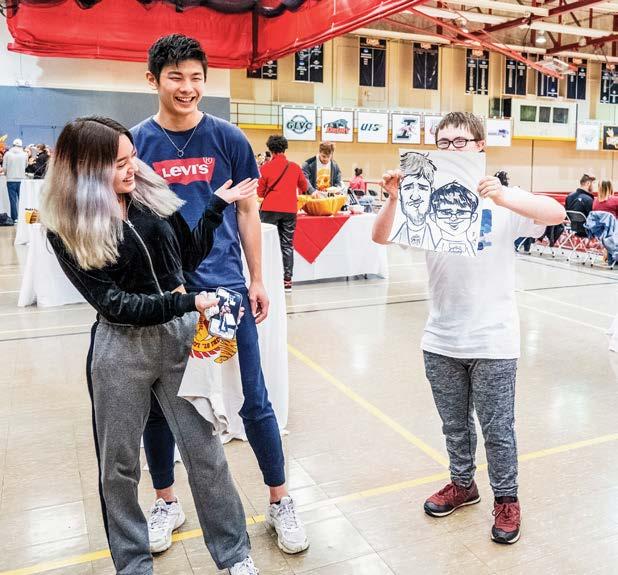
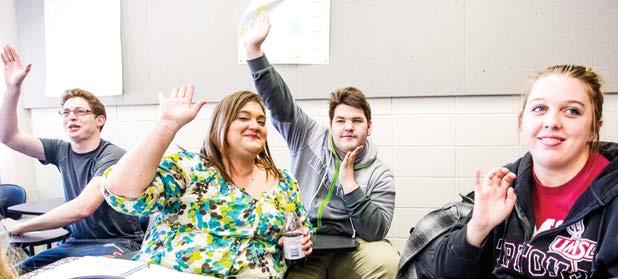
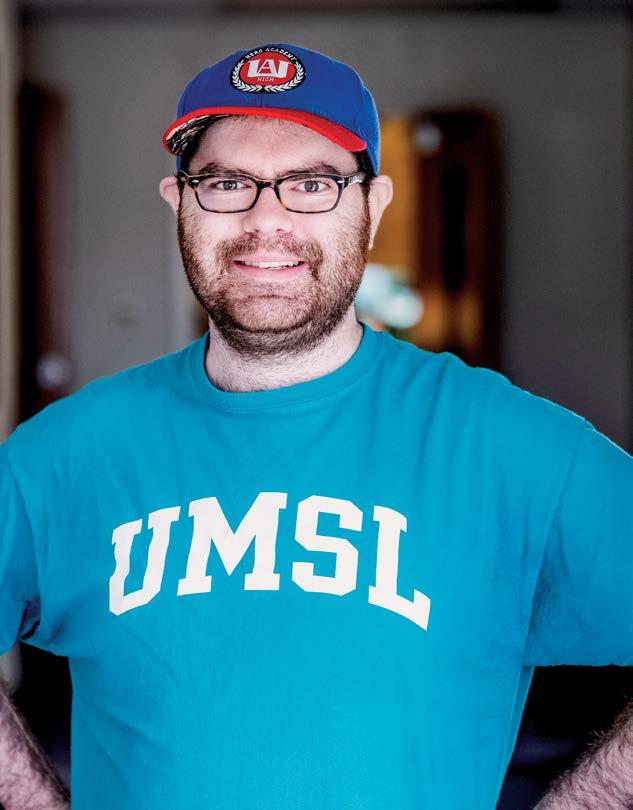

The First Step Toward Success
Regester traces the origins of the Succeed Program to the Higher Education Opportunity Act of 2008. In the wake of its enactment, the U.S. Department of Education placed a greater emphasis on access to higher education for students with intellectual disabilities – a group that had historically been marginalized. By 2010, federal funding became available for postsecondary education programs supporting that mission, and Regester had begun discussing the possibility of one at UMSL with several people, including Deborah Baldini, then associate dean of the College of Arts and Sciences, as well as Kathy Meath, Mark Keeley and
SPRING 2023 22
Clockwise from left: UMSL students Phong Ly, Yamashita Kazuki and Succeed student Ryan Austin at Pack the Stands during Homecoming 2023; Andrew Holman, one of the first Succeed students to earn an undergraduate degree; a group of students in one of April Regester’s special education courses in 2014.
Sharon Spurlock of St. Louis Arc, an organization that empowers and provides support for people with intellectual and developmental disabilities.
“Baldini is a parent of a young adult with Down Syndrome, so she had a personal interest in having something like this,” Regester says. “She was the administrative leader that was our first champion at that time.”
The team missed the window for federal funding but knew some sort of seed funding was necessary. Regester, Baldini and the St. Louis Arc representatives sought grants from three local disability organizations and secured approximately $200,000 for one year of programming. With money in hand, the group brought the proposal for Succeed to the provost and deans in 2012. “Legend says that we were the only program to ever come to the meeting and then be approved on the spot,” Regester says with a laugh. “We had some potential students that came to that meeting and talked about their personal experience of wanting to attend higher education and what that meant to them. I thank those two students because you had a bunch of administrators who were looking at someone who said, ‘Hey, I want to go to college. You have an opportunity to make it happen.’ They could not say no.”
The program was approved for a Chancellor’s Certificate in 2013 and began with a cohort of nine students the first year.
Lessons Learned
During the early years, the program was bolstered by advocates across campus including Lidgus, who was the director of Residential Life and Housing at the time; Carole Basile, then dean of the College of Education; Curt Coonrod, then vice provost for student affairs; and D’Andre Braddix, then assistant dean of students.
In his initial conversation with Baldini, Braddix remembers being unsure of how the program would be integrated into campus. However, after a trip to observe a similar program at another university, Braddix returned energized by what he witnessed.

“It just inspired me to come back to campus and be a champion and advocate for the program,” he says.
The Succeed team learned many lessons during that time. Regester recalls navigating how to provide support for parents and family members who were used to K-12 programs that typically allowed parental figures a large amount of input in their child’s experience. The team had to gauge what level of support families needed for that transition. Grace Francis, former director of Succeed, notes that they had to reconsider their approach in some cases.
“With families, instead of saying, ‘your child’ or ‘child,’ we would say ‘the student’ or ‘the young adult,’” Francis says. “Those little changes were really instrumental in how people shaped their expectations and their perceptions of these young adults, these tuition-paying students. I think that mindset really helped elevate where Succeed is now.”
Andrew Johnson Kliethermes, Succeed assistant director, says the program also shifted from broad directives to person-centered planning. That focus on individualization and independence informed key tenets of the program that are still employed today. “We really focus on, throughout the four semesters of the program, enhanced independence and self-determination in our four main pillars: live, learn, work and play,” he explains. “So, independent living skills, strong social network and connections to campus and culture. Then vocational exploration and experience, building a professional network, having work experience and a good idea of what a student wants to do as far as providing for themselves for an enviable life after graduation. Academic exploration, too. So, being a full-time enrolled college student with a full academic schedule and being immersed in an inclusive environment, where peers are learning from them and they’re learning from their peers.”
Major Milestones
Despite some initial growing pains, the Succeed Program has gone on to see many successes during the past 10 years and become a vital part of the university.
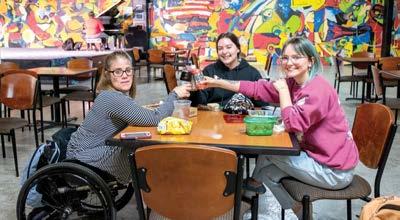
Lidgus says implementing the program’s residential component, in which Succeed students live with undergraduate students in Oak Hall, was a major breakthrough.
“We really helped to grow what inclusive housing looks like for this population,” he says. “That turned out to be one of the things we, as a program, have been known for in terms of how we include students in the residence halls and train and support the residential life staff. Our first milestone was growing and developing inclusive housing.”
UMSL MAGAZINE 23
“We really focus on, throughout the four semesters of the program, enhanced independence and self-determination in our four main pillars: live, learn, work and play.”
– Andrew Johnson Kliethermes
He adds that the program’s work pillar has had a significant impact on the university as well.
“We love our students getting jobs because working on campus is actually a learning experience for all students,” Lidgus says. “When you work in housing or you work at the rec center, they have their own employment outcomes for student workers that help teach leadership skills, social skills and grow students as employees. Our students are learning there, and our students are teaching future workers at the college level to work with individuals with disabilities.”
Other milestones include the FOCUS St. Louis award and TPSID grant, which has gone toward expanding industry-recognized pathways, enhancing support and partnerships in existing programming under the leadership of Assistant Professor Magen Rooney-Kron and building statewide awareness and knowledge of postsecondary education programs through the development of showmecollege.com. The Link program, in particular, has been a major step forward.
“The Link program is an example of how students have pushed this program to be what it is today,” Kliethermes says. “One student said, ‘I want to get a degree after completing Succeed,’ so we helped them matriculate. From that one student, we now have 18 degree-seeking students that we support across numerous colleges. That one student started the idea of there being domains of support that aren’t being met. We can meet those needs.”
Holman is one of those students. He thrived in the certificate program, where he readily made friends across campus, and when he heard Nardi-Warner wanted to pursue a degree, he joined the campaign to extend Succeed’s support.
“We’re both like, ‘I’m really good at this college stuff; let’s keep going,’” Holman says. “But we needed a little bit of help. That’s why we reached out and said, ‘Hey, if we continue this, would the Succeed staff still be able to support us?’”
In the educational studies program, Holman has focused on adult and youth development. He aims to work with others with
disabilities, teaching life skills in group settings. The end of the semester has been busy for Holman as he completes his degree and also interns with St. Louis Arc, but he’s remained fixated on graduating.

“I just can’t wait, but I can’t get complacent,” he says. “I’ve got to keep focusing.”
The Succeed staff also has an eye toward the future.

“We’re not done growing yet, and I think that’s what’s awesome,” Lidgus says. “The next frontier here is, how do we continue to grow our vocational program? How do we solidify teaching other professionals to be part of programs like ours? How do we become that center of inclusive education at UMSL that we really need to be for students with intellectual and developmental disabilities?”
In time, those questions will no doubt be answered. For now, Regester is looking back fondly at what the program and its students have accomplished over the past decade.
“It’s a very cool thing to see inclusion in a space that I think 10 years ago people would think maybe wasn’t possible,” she says, “then to see how our students demonstrate massive successes on par with their colleagues, how they can be leaders and how they can meaningfully and fully participate in all aspects of college life.”

“We're not done growing yet, and I think that's what's awesome."
24 SPRING 2023
– Jonathan Lidgus
By David Morrison
Ryan Ruamwijitphong is a 2022 graduate of Rockwood Summit High School in Fenton, Missouri. He is less than a year into his college career at the University of Missouri–St. Louis, and he is already a junior.
That’s because he brought 57 credits with him to UMSL from 18 different Advanced Credit Program classes that he took in high school.
“I wanted to get a head start in my education to graduate college earlier,” says Ruamwijitphong, who is studying biology. “I don’t have to take as many credits a semester compared to a regular college student doing undergrad for four years in order to graduate on time, so I have a lot more time to focus on every course that I am taking.”
The ACP is a dual-credit program that offers qualifying, highcaliber high school students in select schools the opportunity to earn college credits and become familiar with the college experience while still in a high school setting. UMSL partners with dual-credit instructors at high schools around the St. Louis region who are qualified and meet the criteria of the Higher Learning Commission and the Missouri Department of Higher Education to offer courses for college credit to students at their home schools.
ACP courses are generally available to high school juniors and seniors with a 2.5 grade-point average or greater, as well as sophomores with a GPA of at least 3.0. Unlike Advanced Placement exams, college credit is awarded based on a semester or yearlong grade through the ACP. Director Kathleen Burns hopes
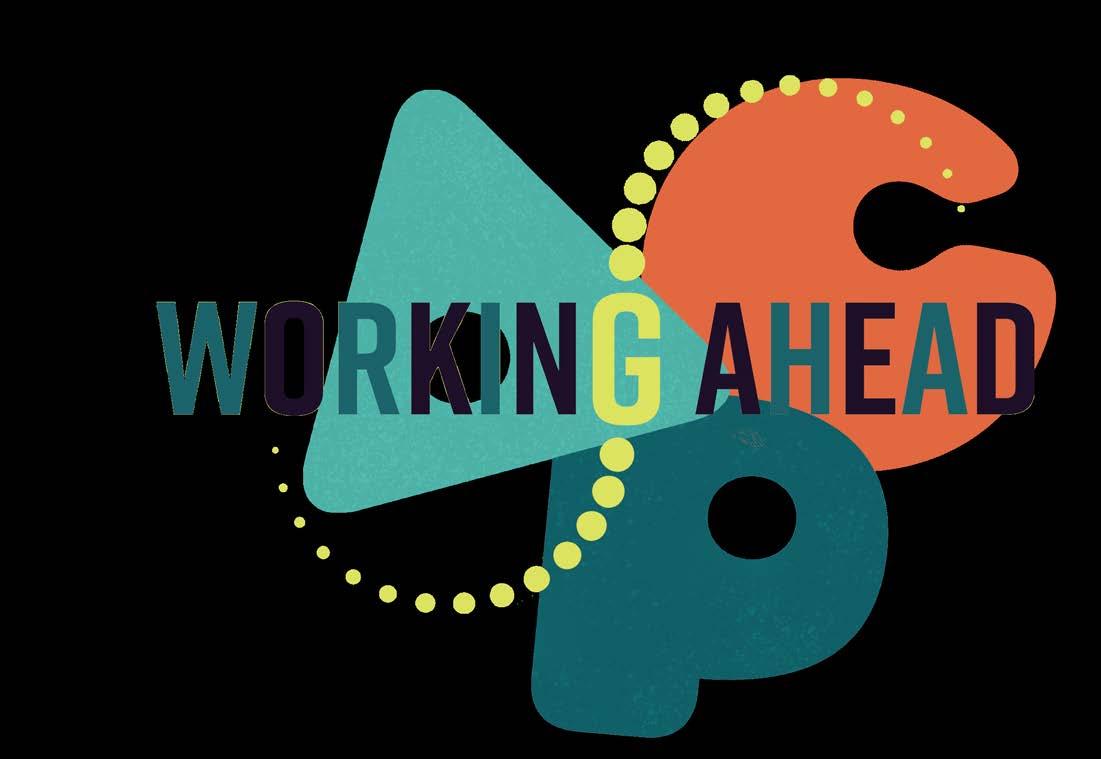
more students across the region.
“We’ve tried to make it so that any student who could possibly be successful in completing a college-level course could have access to these courses when they’re in high school,” says Burns, an assistant dean and director of UMSL’s early college programs.
The numbers say it all. When the ACP started at UMSL in the 1986-87 school year, there were 919 student enrollments – the total number of courses students are enrolled in through ACP – across 10 high schools in six districts. In 2021-22, those numbers ballooned to 12,255 enrollments across 88 high schools in 35 districts.
“It’s really incredible,” Burns says. “The number of courses we offer has grown, and we’ve been able to get a broader spectrum of students into all these different classes. My goal every year is to increase the numbers of students taking college classes via UMSL’s ACP, and making that reach – the UMSL partnership – grow and get better. Just being able to offer more and more to the high school students is awesome.”
UMSL’s ACP has grown into the largest dual-credit program in the state of Missouri and one of the most successful in the country. It has allowed thousands of students to dip their toes into the college experience while still in high school, allowing them to earn credit, accelerate their path through higher education and save money along the way.
UMSL MAGAZINE 25
88 high schools
“It’s a big deal to know that you’re already cutting it in a college class, that the doors to college are open to you,” says Jennifer McKnight, professor of graphic design at UMSL and the ACP liaison for art and design. “This piece feels like we’re truly serving our community by making these pathways clear.”
Setting the standard
90 courses
Across the 88 high schools in the ACP, 517 adjunct teachers lead 1,032 sections in 90 courses covering 19 different subjects.
All of these courses offer high school students college-level education. The high school adjuncts’ relationship with their 29 UMSL faculty liaisons help make this so.
She says it’s an illuminating way to learn about all corners of the region, as well as what educational methods reach today’s high school students.
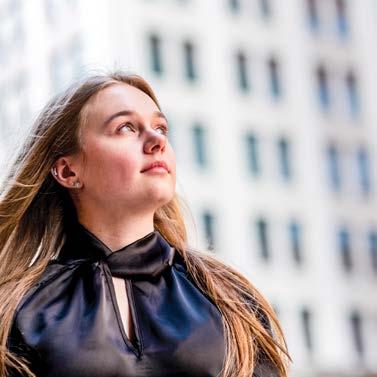
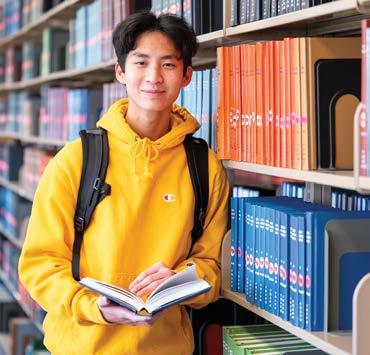
“You get to go into a lot of different environments,” Manion says. “It’s really fun to be in the room with the students. They tend to have a higher interest in the subject, be engaged, and I have opportunities to talk to the students about what college is going to be like and answer questions about the transition.”
For many students, their experience with ACP courses makes that transition much smoother.
“We make sure that, if college credit is being offered for the work they’re doing in high school, it really is at the same level as the university,” says Larry Marsh, coordinator of the UMSL German Culture Center and ACP German liaison.
A helpful head start
517 adjunct teachers
19 different subjects
“We’re growing by leaps and bounds. We keep getting requests from high schools about adding new classes,” says Jenny Shrensker, teaching professor in the UMSL Department of Mathematics, Physics, Astronomy and Statistics and an ACP math liaison. “They seem excited about it, and we’re happy to do it with them. UMSL has a really smooth program. We’ve got a tight-run ship and people in the ACP office who know what they’re doing, are smart and responsive.”
Liaisons play a number of different roles within the program. If an adjunct would like to lead an ACP course at their school, their department liaison first ensures that the teacher has the required credentials: a master’s in their subject area or a master’s in a related field with at least 18 graduate hours in their content area. When an adjunct is approved to teach an ACP course, the liaison works with them to ensure their syllabus conforms to UMSL standards. Then, the liaison will help lead the adjunct’s professional development opportunities within the program and go on classroom visits to see the course in action.
Anita Manion, assistant professor of political science, works with around 25 teachers across more than 20 schools on a yearly basis in her role as UMSL’s ACP liaison for political science and gender studies.
ACP credits are accepted at all of Missouri’s public colleges and universities and the majority of institutions across the country. Aside from giving students an early taste of college courses, starting the higher education journey with credits already in place helps students graduate earlier, pursue multiple degrees or take a lighter course load once they arrive on campus.
Natalie Powers, a graduate of Fort Zumwalt West High School in O’Fallon, Missouri, and current UMSL sophomore, is using the six credit hours she earned through ACP courses to enter a 2+3 program – in which she can earn a bachelor’s and master’s degree with fewer total credit hours than would be required to complete each degree independently – earlier.
“It has helped to where I can take the classes I want to take earlier, instead of taking more general education classes,” says Powers, an accounting major. “I enjoyed being able to take those credits in, and it’s helped a lot financially and stress-wise.”
Powers took ACP courses in speech and English during her time at Fort Zumwalt West and found she enjoyed both the accelerated pace at which her teachers presented the material and the mature, almost professorial way in which the teachers interacted with their students.
The program also makes college more affordable, as students pay $70 per credit hour for ACP courses, considerably less than they would pay for courses on campus. Adjuncts also have the opportunity to help their students lower that price tag through scholarships
“We consistently receive and hear testimonials from Chaminade graduates and their parents that stress the significant and transformative impact of ACP courses on their collegiate experience,” says Stephanie Kralemann, high school coordinator for the Pathway to Access College Early (PACE) Program at Chaminade College Preparatory School in Creve Coeur, Missouri.
“In addition, the financial benefits of ACP courses saved them, in some cases, up to $50,000 in college tuition, and oftentimes more. Collaborating and working with UMSL has always been a terrific experience. They are so student-oriented and want students to succeed. Reaping academic and financial benefits from ACP courses is their constant goal.”
SPRING 2023 26
UMSL students
Natalie Powers and Ryan Ruamwijitphong got a head start on their college education through UMSL's ACP.
UMSL's ACP has grown into the largest dual-credit program in the state of Missouri and one of the most successful in the country.
 By Timothy Wombles
By Timothy Wombles
Israel Collier never saw herself on the other side of the world in Moldova, advocating for the ethnic Roma population and speaking Romanian, Moldova’s official language, but she always envisioned a life of service.
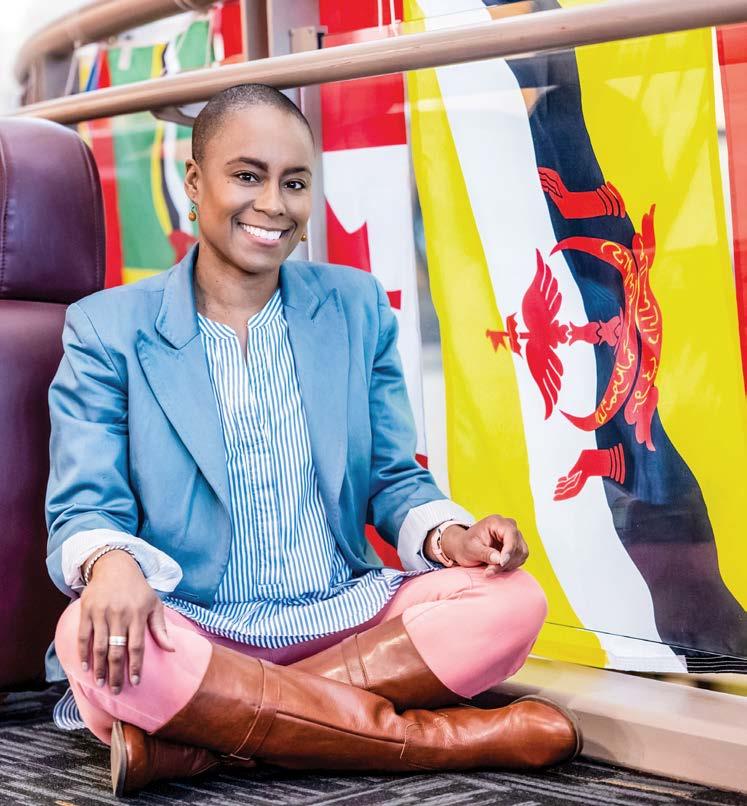
Growing up across from Beaumont High School in north St. Louis, Collier inherited a sense of empathy for others from her dad, who was a mentor to many fatherless children in the neighborhood. “We shared our father with them,” Collier says. “That was foundational for me.”
UMSL grad and nonprofit leader
ISRAEL COLLIER
It was in that spirit of service that Collier enrolled at the University of Missouri–St. Louis, earning her BS in biology with a minor in chemistry. While at UMSL, Collier worked as a mentor for multicultural students, volunteered at clothing drives and tutored in French and biology.
“I had every intention to become a physician,” Collier says. But while she was in medical school studying osteopathic medicine, a fateful mission trip to Guatemala in 2011 changed the course of her life.
“I remember the way the children would gather around to share my sack lunch,” Collier says, describing the eagerness in children’s faces as they peeped expectantly into her simple brown bag. “I knew then that poverty injustice was real.”
The next year, Collier went to Nicaragua on another mission trip, visiting a jail with inmates packed so tightly they were nearly on top of each other. The year after that, she traveled with Habitat for Humanity building homes in Colombia. Collier ultimately left med school and applied to the Peace Corps in 2014, prepared to go wherever she was needed. “When I got the application, I said, ‘just send me anywhere,’” Collier laughs. “When it said Moldova, I had to break out the map.”
When she arrived in Moldova, there was naturally culture shock, but Collier grew into the country.
“At first I felt like I was from the moon,” Collier says, recounting her interactions with locals, some approaching and touching her face.
advocates for Roma minorities in Moldova
But by the end of her 8-year stay – in part cut short by the Russian invasion of neighboring Ukraine – Collier was fluent in Romanian, navigating the political landscape and advocating for legislation on behalf of Roma minorities in Moldova.
While in Moldova, Collier started the nonprofit ACOPERI, an acronym for Assistance, Cooperation, Opportunities, Protection and Equality for Roma and Immigrants, but also a verb that means “to cover.” ACOPERI now advocates for Roma fleeing Ukraine, and the organization provides direct services for the displaced such as assistance with asylum paperwork, connections with legal resources and direct hospital bill coverage.
“It’s essential to not only give back,” Collier says, “but to work alongside, to build together.”
In the near term, Collier is staying busy while back in St. Louis, growing ACOPERI, writing a book about her experiences in Moldova and applying to law schools as she continues to advocate against injustice anywhere.
Collier wants people to know that anyone, no matter their background, can help those in need.
“People may not know, but nowadays you can advocate digitally,” Collier says. “You can write letters, run social media accounts, educate and communicate online.”
SPRING 2023 28
Cybersecurity major CIN LAM MUNG aids
his community in Myanmar through music
By Burk Krohe
By the afternoon of Feb. 1, 2021, videos of tanks rolling through the streets of Naypyitaw, Myanmar, were aired by news outlets across the world. That morning, the Tatmadaw, Myanmar’s military, deposed the country’s ruling party, the National League for Democracy, in a coup d’état.
Cin Lam Mung, a junior cybersecurity major at the University of Missouri–St. Louis, watched the violent siege unfold half a world away, saddened and speechless at the fracturing of the country’s delicate progress toward democracy. His thoughts immediately went to his relatives in Myanmar.
“I was worried about my grandma and the old people in my village,” he says. “There aren’t a lot of jobs, and they just don’t have a lot of security. So, if there’s instability, they’re not going to have any food.”
As the conflict continued, Mung was inspired to use his lifelong passion for music to help the people of Myanmar. He recorded “Nang a Ding Om Den Ning,” an album of 12 love songs, under the stage name Key Mung and has sold copies to raise money to benefit those affected by the coup.
Mung, a member of the Zomi ethnic group, grew up in Yauh Cho Kwin, a small, rural village. The isolated village didn’t even have a telephone, but it had plenty of music. “Even though our village didn’t have a lot of technology, our church did have some really old microphones,
instruments and huge, old loudspeakers,” Mung says. “That made music interesting for me.”
As Christians in the predominantly Buddhist country, Mung’s people often faced religious persecution. In 2008, his father – a church leader targeted by the military – came to the United States as a religious refugee. The rest of the family followed in 2013, resettling in St. Louis. “When we came here, everything was different,” Mung says. “But the technology was so difficult. I had never used a computer before or a smartphone, and then I was in high school all of the sudden.”
Mung adapted deftly, learning English at the Nahad Chapman New American Academy and earning a place in the cybersecurity program at UMSL. In addition to his humanitarian efforts, he uses the knowledge he’s gained at UMSL to provide IT support for his immigrant and refugee neighbors in St. Louis.
On “Nang a Ding Om Den Ning,” Mung draws upon his love of country, pop and hip-hop music, as well as Zomi singers Lengtong Pauno and Thawn Kham. He took a DIY approach to the album, singing lead vocals on each song, recruiting backing musicians and producing each track.
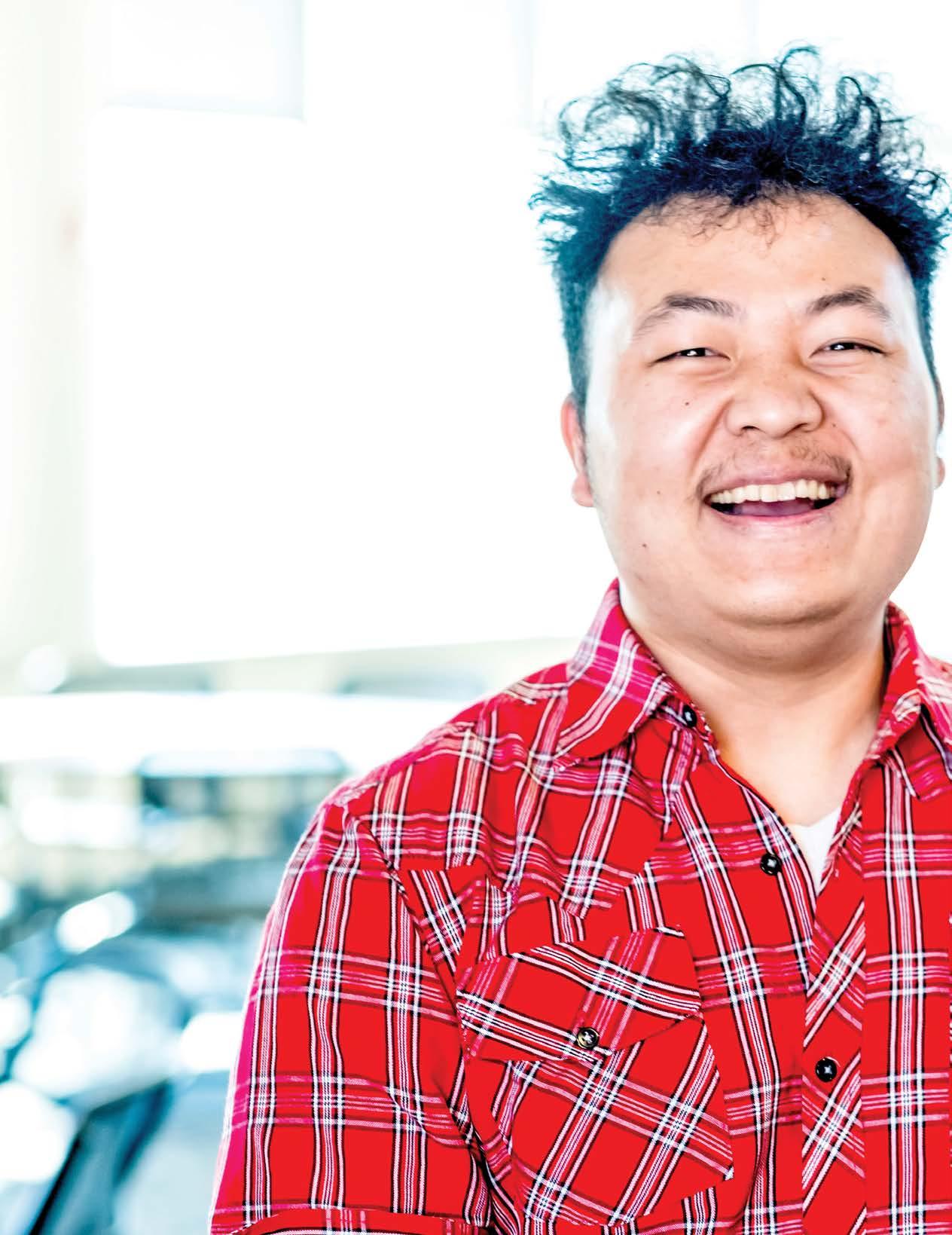
By promoting it on Zomi National TV, which reaches Zomi refugees in numerous countries, and through his church, Mung sold enough copies to feed 31 families in Yauh Cho Kwin for three months. Each family received bulk packages of rice, noodles and oil.
After Mung graduates from UMSL, he intends to continue aiding those in need while pursuing his passion.
“I would like to work in cybersecurity, any company, but a job where I can use technology, keep people safe and help people,” he says. “I would also like to make more music. I am working on my gospel album, and it will be coming very soon.”
Adam Presswood was a frequent guest in the stands at Busch Stadium II as a child, during the heyday of St. Louis Cardinals stars such as Ozzie Smith and Willie McGee, and he’s continued making occasional visits to the team’s new home since it opened in 2006. But until last summer, Presswood hadn’t set foot on the field or other parts of the stadium not usually open to fans. That changed in June when he was hired as the supervisor of stadium tours and museum operations.
“They took me out to see the field that first day, and I realized where I was,” Presswood says. “There is a feeling of, ‘Oh my gosh. Look at what I’m looking at.’ I don’t think anybody’s completely immune to that.” Presswood, who earned a master’s degree in history with a concentration in museums, heritage and public history from the University of Missouri–St. Louis in 2020, now tries to help others share in similar experiences.
From his office under the stands behind home plate, he helps oversee a team of tour guides who bring in visitors from throughout the Midwest – and often far beyond – to get a different view of the stadium. Guests gain more insight into the organization and its history than they can pick up from watching a game in the stands or on television. Typical tours take visitors inside the radio booth and onto the warning track and offer lessons in Cardinals lore.
In his role, Presswood also helps coordinate artifact spotlights each weekend, working with the archivist at the St. Louis Cardinals Hall of Fame and Museum to bring out and show visitors a piece of memorabilia that doesn’t usually see the light of day.
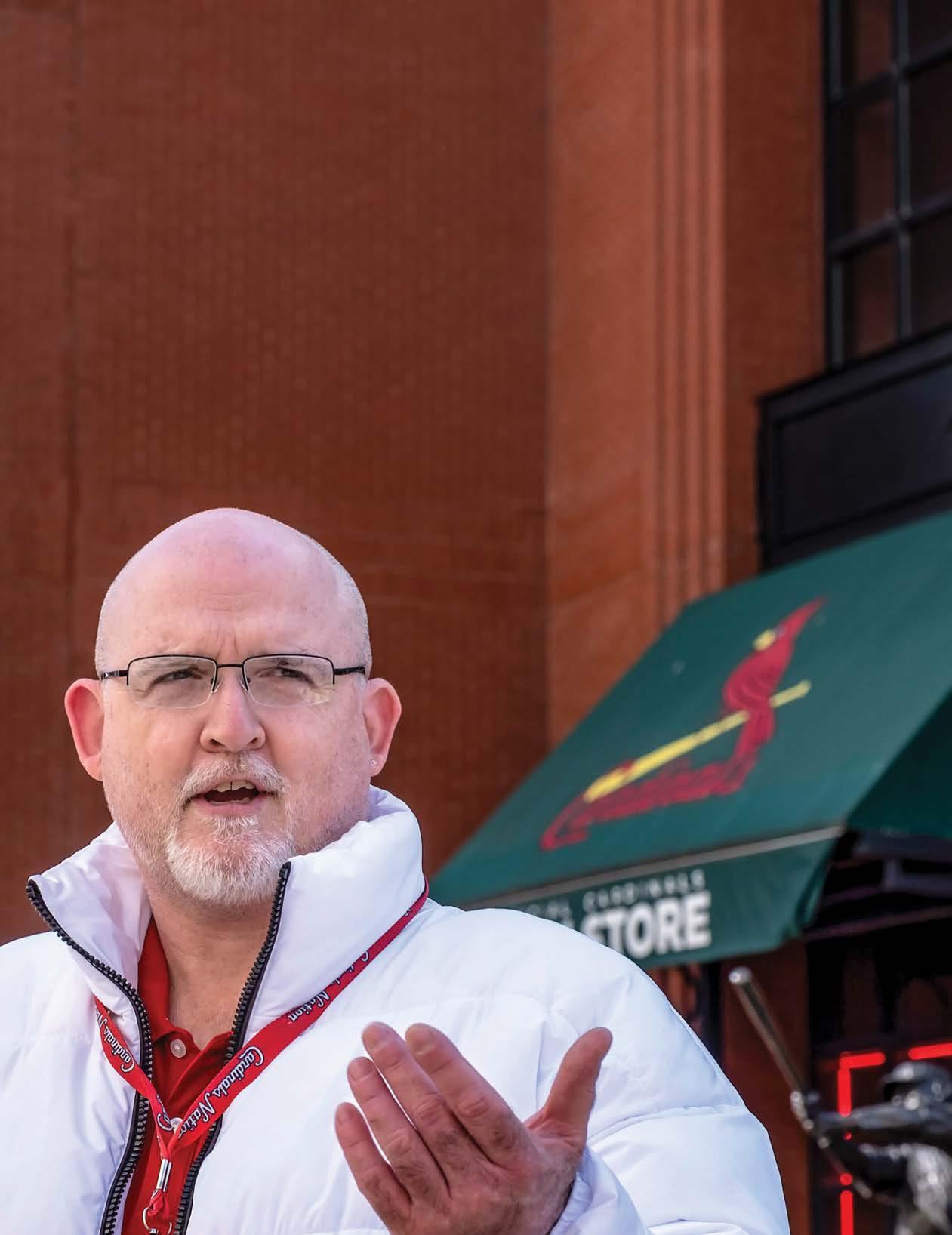
Presswood wasn’t sure what kind of position he might wind up in when he first made the decision to pursue a master’s degree after returning to college in his 30s to earn a bachelor’s in history at Washington University in St. Louis. But his passion for history centered on topics such as the Holocaust, World War I and World War II.
Perhaps the biggest lesson faculty members such as Lara Kelland and Andrew Hurley imparted on Presswood while a graduate student at UMSL was to be adaptable – particularly as museums across the country were shuttering their doors amid the onset of the COVID-19 pandemic, only months before his graduation.
“Between the emergence of the pandemic and my graduation, the entire discussion changed, and it was all about making us as willingly and capably versatile as we can be,” he says. “To figure out how many hats we could possibly wear to stay in this profession.”
He’s taken that to heart as he’s found multiple avenues to share his knowledge, working as an adjunct faculty member teaching history courses on the Holocaust and other topics at Maryville University and recording and organizing oral histories at Soldiers Memorial Military Museum.
No matter the subject, Presswood’s work has focused on helping people experience parts of history and culture.
“You can’t be a good public historian,” Presswood says, “if you’re not trying constantly to figure out ways – new and different all the time –to make the public feel connected to what you do.”
By Steve Walentik
ADAM
PRESSWOOD helps fans connect with the St. Louis Cardinals from a new perspective
JAVIA GILLIAM
By Wendy Todd
The onset of the COVID-19 pandemic was an opportunity for many people to reflect, rest and regroup. Some took up new hobbies, learned another language or mastered a new skill. Kaje Sanford, assistant director of Student Financial Services at the University of Missouri–St. Louis, and his wife, Javia Gilliam, drank – but with a purpose.
The couple became entrepreneurs and in October 2021 created Pour Decisions STL, a mobile bar service offering elevated alcoholic and non-alcoholic beverages throughout the St. Louis region. The idea started brewing during the pandemic, when the two UMSL alumni were entertaining themselves at home, practicing mixing up craft cocktails. Gilliam had been laid off due to the pandemic and was contemplating her next steps.
“We had already been kind of experimenting with cocktails and craft practice because we were already in the house,” Sanford says. “She literally came downstairs and was like, ‘We’re gonna start a mobile bar,’ and I was like, ‘Oh, yeah, you know, you got the vision. Let’s see what we do with it.’ And that’s how it was founded.”
The couple offers their bartending services for pop-up events, and guests can also book Pour Decisions’ mobile trailer. The couple bought a used horse trailer they found online that was in bad shape. Sanford and his mother DIY’d the renovations, turning it into a bar big enough for them to store alcohol and ingredients and serve customers through a walk-up window.

But the business has a deeper intent beyond just slinging drinks. The couple designed Pour Decisions with the idea of bringing communities
together, with signature drinks that include ingredients they grow in their backyard, such as jalapeños and mint, but they also wanted to make drinking culture more accessible for the Black community.

Gilliam, who worked at a large liquor retailer in 2018, received formal training in the alcohol industry, including wine, spirit and cocktail flavor profiles. That education helped the duo design their signature drinks, incuding Persephone’s Love, a Margarita made with jalapeño, tequila and pomegranate. During in-store tastings, Gilliam also observed how some Black patrons were treated differently than white patrons.
“We really got into the business for accessibility,” Gilliam says. “I see the Black experience and alcohol, and we just aren’t highly represented. So we wanted to create a space where people feel comfortable, and they were getting a quality cocktail at a very good price.”
Sanford’s energy and dedication complement Gilliam’s master’s in business intelligence and information systems from UMSL and experience with coding that she used to build the company’s website backend. Thanks to the couple’s combined talents, business has taken off, with clients including St. Louis boutique Golden Gems, jewelry retailer Joya and this year’s Mayor’s Mardi Gras Ball. For now, there are no immediate plans to open a brick-and-mortar location, but they have recently purchased a double-decker bus for events like micro-weddings.
“I don’t know that we quite saw the scale of what this could be in the beginning,” Gilliam says, “but we were like, ‘We got a plan, and we can grow this, you know?’”
31 UMSL MAGAZINE
With Pour Decisions STL, KAJE SANFORD AND
are making cocktail culture more accessible
1980s Dennis Hancock, BSBA 1980, was elected to the St. Louis County Council.
Dan Lauer, BSBA 1983, received the Champions for Diversity and Inclusion Award from the St. Louis Business Journal.
Sheila Burkett, BSBA 1989, was selected for the 2023 St. Louis Titan 100 program.
1990s Timothy Green, BA 1990, began a new position as the executive vice president of the Electrical Connection.
Stephen Savis, BSBA 1993, began a new position as the chief human resources officer with ESCO Technologies.
Daniel Isom, BA 1994, MA 2003, PhD 2008, began a new position as vice president of corporate safety, security and crisis management at Ameren.
Joe Anemone, MA 1997, began a new position as an investment management consultant II at Fidelity Investments.
Sarajeni Hammond, BA 1998, was promoted to vice president of human resources, consumer health for North America at Bayer.
Jacqueline Goerck, PhD 1999, received the 2022 Robert R. Hermann World Ecology Award.
Blake Schwalb, BA 1999, began a new position as director of services at World Wide Technology.
2000s Opal Jones, BSBA 2000, was selected for the 2023 St. Louis Titan 100 program.
Sarah Cowart, BA 2002, was promoted to product delivery manager at Mastercard.
Orvin Kimbrough, MBA 2002, received the Corporate Executive of the Year Award at The St. Louis American’s 2023 Salute to Excellence in Business Awards.
Leslie Mar’Na, MSW 2002, began a new position as a program manager at Arizona Friends of Foster Children Foundation.
Christopher Lehmuth, BS 2003, was named vice president of innovation/ new products at TurningPoint Healthcare Solutions.
Pooja Srivatsa, MA 2003, began a new position as a product manager at Genentech.
Kelly Kenkel, BSBA 2004, began a new position as a program leader at Edward Jones.
Lauren Updike, BS 2004, began a new position as a registered nurse with SSM Health.

IN DECEMBER 2022, AFTER NEARLY 60 YEARS OF DEDICATION, A CAREER, CHILDREN AND GRANDCHILDREN,
FULFILLED A DREAM HER FATHER HAD FOR HER: EARNING A COLLEGE DEGREE. Garrison began her college journey in 1966 as a mother of two young children and in December finally walked across the stage at the Mark Twain Athletic Center, earning her bachelor’s degree in French with honors at the age of 85.
ALUMNI Q&A Let us know what you're up to! Send class notes and life updates to: alumni@umsl.edu umslalumni.org 314-516-5833 32 SPRING 2023
Connected
want to hear from you! Share your news, photos and follow us at @UMSL.
Stay
We
GARRISON
IRENE
Why was getting a degree so important to you after all these years?
I wanted to fulfill my father’s dream for me to attend university. He was saving money for my education, and I am sure for my younger sister, Katherine. Unfortunately, he died from a heart attack when I was a sophomore in high school and Katherine was in elementary school.
How did the continuous pursuit of your degree impact your life?
I originally enrolled at UMSL in 1966, but disruptions occurred throughout the years, such as moving due to my husband’s employment opportunities. Once we returned to St. Louis, I re-enrolled at UMSL and continued from 1986 to 1990. Due to work, continuing education in my profession as well as family obligations, I had to put my pursuit for a degree on hold until retirement. Finally, from 2018 to 2022, I realized I was free to finish what I started, and graduation was only a few credit hours away. Our son, John, and daughter, Kathy, had earned their degrees from UMSL and Washington University in St. Louis, respectively. All five of our grandchildren have graduated from universities in other states, and now I can say that I have followed them in the same path here at UMSL.

What are some of your best memories of your time at UMSL?
I remember having inspiring instructors/professors at UMSL who made me want to learn and research information beyond the classroom. Psychology, geology, English and French literature courses were my favorite and most successful. The professors were always accessible to help with problems when clarification was needed. My last elective course was Spanish, and I would like to thank Professor Amy D’Agrosa for her patience and timeliness in answering my many questions. Sarah Klekamp, my advisor, guided me through each and every requirement of my schedule, for which I am deeply grateful. I was elated to happen to meet them in the building of the graduation ceremony. I would also like to thank Violaine White, French advisor, who was instrumental in making sure that I had followed the planned schedule correctly and completed the required French courses.
Describe the feeling you had participating in commencement.
Being able to participate in commencement was a joyous feeling for me because I achieved my longtime goal of completing my degree and knew that I accomplished my father’s wish. I was grateful to my f amily for encouraging me and, especially, to my husband, Arnold, who has supported me in my endeavor, no matter the time, nor the additional expense. Most of my family members had come a long way to attend the graduation ceremony, and I appreciated their enthusiasm as I walked to receive my diploma.
Alumni help upgrade Student-Athlete Academic Commons
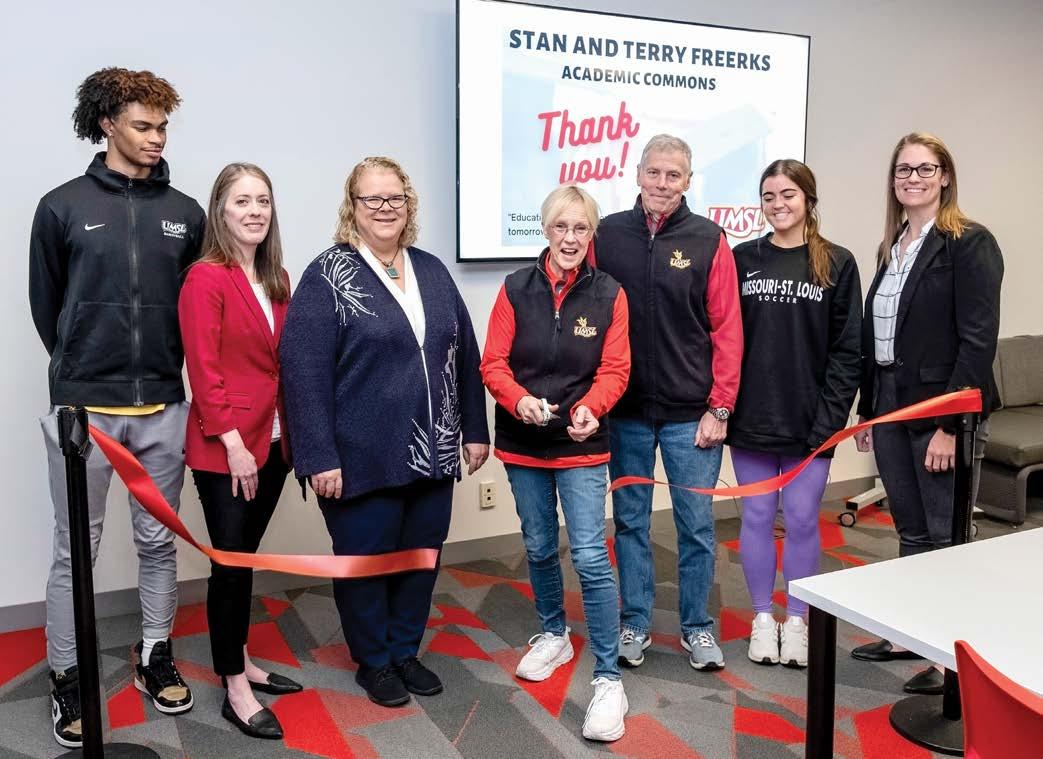
With about 270 student-athletes at UMSL and a study space for just 30, the Student-Athlete Academic Commons in the Mark Twain Athletic Center needed an upgrade. Conversations between UMSL Director of Athletics Lori Flanagan, members of the UMSL Advancement team and Stan (MBA 1992) and Terry Freerks (BA 1977, MEd 1979) – UMSL Distinguished Alumni Award winners and avid university boosters – brought that goal to fruition.
Thanks to a generous financial donation from the Freerks, the space was overhauled during the 2021-22 school year and ready for use at the beginning of the fall semester. As former collegiate swimmers – Terry at Arizona State University and Stan at Cornell University – the Freerks know what it takes to succeed in athletics and academics. It’s a fine line to walk, but they understand that doing so develops character and life skills.
“You have to be disciplined, you have to be committed, you have to have a lot of follow-through,” Terry said. ”So, this project was one that we felt strongly about because it helped the athletes address the academic side of their responsibilities.”
Kate Kimble, BA 2006, began a new position as a public information director at Larimer County Sheriff’s Office.
Tiffany Patton, BSEd 2006, began a new position as a professional development coordinator at Riverview Gardens.
Lana Kerker Oliver, BA 2007, began a new position as a scrum master with Spire.
Lisa Baker, BA 2008, MA 2012, began a new position as a technical product owner at Brooksource.
Pearlina Boyd, MA 2008, began a new position as a mediator with the Association of Missouri Mediators and was named associate member of the Chicago Bar Association.
Miranda Ming, BSEd 2008, MEd 2010, EDSP 2012, PhD 2015, coauthored “The Path Less Traveled: Creating Authentic STEM Career Pathways by Removing Barriers for Underestimated Youth.”
Michael Rich, BS 2008, began a new position as a financial planning and analysis manager at Milestone Equipment Holdings.
Kavina Sprehe, BA 2009, began a new position as a project/ program management coordinator at Elsevier.
Benjamin White, BLS 2009, started a new position as a diversity, equity and inclusion program manager at White Cap.
2010s Danielle Faucett, BA 2010, was promoted to associate registrar at UMSL.
Michael Wolpert, BSAcc 2010, began a new position as a director of global accounts receivable at Cushman & Wakefield.
Ashlee Young, MEd 2011, started a new position as associate director of first scholars initiatives, NASP at the Center for First-Generation of Student Success.
Kitty Castilleja-Cutts, BSBA 2012, began a new position as an HR manager at Operation Food Search. Alex Ellison, BS 2012, was elected to his second consecutive four-year term as prosecuting attorney of Pike County, Missouri.
Brandon Lewey, BS 2012, was promoted to consulting engineersystem protection at Ameren.
SPRING 2023 34
Jennifer McNamee, MBA 2012, began a new position as a fundraising events manager at the American Parkinson Disease Association of Greater St. Louis.
Marisa Roth, BS 2012, MA 2015, began a new position as a data analyst at UMSL.
Jared Wendlandt, BS 2012, began a new position as a senior compensation analyst at Gopuff.
Jennifer Barlass Amatya, MPPA 2013, began a new position as a school relations manager at Greenheart International.
Elizabeth Eikmann, BA 2013, was awarded the Lewis E. Atherton dissertation prize from the State Historical Society of Missouri for her dissertation, “In Her Image: Photography, Whiteness, and Womanhood in St. Louis, 1877-1920.”
Hongjin Li, BSN 2013, was awarded a National Institutes of Health grant to further her research on supportive care for breast cancer survivors.
Joshua McCoy, BA 2013, began a new position as a new truck sales representative at Gateway Truck & Refrigeration.
Mike Philbin, MSW 2013, began a new position as a sourcing specialist at Intermountain Health.
Darian Cartharn, BS 2014, began a new position as a clinical sales representative at Intuitive.
Natalie Ellis, MA 2014, began a new position as an associate attorney at Amundsen Davis, LLC.
Bailey Finau, BSEd 2014, began a new position as vice principal at Eastwood Hills Elementary.
Anthony Lynch, BS 2014, BSAcc 2016, began a new position as a senior cloud financial analyst at Enterprise Holdings.
Gabriela Murcia, BBA 2014, began a new position as a financial services manager at EY.
Vivien Palacios, BSBA 2014, began a new position as a F/A-M 18 master production scheduler team lead at Boeing.
Kat Riddler, BA 2014, MA 2016, was promoted to senior project advisor at Express Scripts.
Michael Sherman, BS 2014, began a new position as a senior account manager at LG Electronics North America.
About 50 UMSL Business alumni got their kicks during an exclusive event at St. Louis CITY SC’s CITYPARK

On Nov. 9, 2022, attendees enjoyed a happy hour in a suite, tours of the facility and some fun conversations. The UMSL Business Alumni Chapter holds networking and social events throughout the year including happy hours, wine tastings and outings at Top Golf.
Daniel Shular, BFA 2014, began a new position as a staff photojournalist with the Tulsa World Media Company.
Allison Wieczkowski, BA 2014, began a new position as a senior integrated technologies owner at Oracle.
Tasha Crenshaw, BA 2015, began a new position as an intake specialist at Mercy.
Naomi Green, MBA 2015, began a new position as an adjunct professor at Lone Star College.
Taylar Heaton, BSBA 2015, began a new position as a recruiter with Insight Global.
Jessica Lodes, BSN 2015, began a position as a registered nurse at Missouri Baptist Medical Center.
Kent Morgan, BS 2015, began a new position as a process engineer at Vertellus.
David Spagnolo, BSME 2015, was promoted to systems engineer III at Boeing.
Adam Tiemann, BA 2015, began a new position as an investment risk manager with Edward Jones.
Amber Bell-Christian, BS 2016, EdD 2021, began a new position as a coordinated entry program manager at Family Support Center of South Sound.
Stephanie Cole, BA 2016, began a new position as a senior project manager at Trace3.
Tiffany Shockley, BA 2016, began a new position as a contract administrator at Oracle.
Aidan Leisti, BSAcc 2017, began a new position as a senior internal auditor at Enterprise Holdings.
Jimmy Mundell, MA 2017, PhD 2020, began a new position as a people analytics partner at Netflix.
Sherry Nelson Thomas, MSW 2017, began a new position as the director of development at CareSTL Health.
Madeline Oberman, MA 2017, began a new position as a data analyst and grant writer at St. Louis County Family Court.
Emel Saeidi, BA 2017, began a new position as an electrical design engineer at VanTran Transformers.
In Memoriam
1960s
Louis Peters, BA 1969, on Sept. 11, 2022
1970s
Nancy Gleason, BSED 1972, MA 1988, on Apr. 3, 2023
Sheila Kay Reynolds Shantz, BSBA 1972, on Nov. 8, 2022
Ruth Streit, BS 1974, on Dec. 9, 2022
Eustolia Spuhl, BA 1977, on Dec. 28, 2022
1990s
Robert Leonard Jr., BA 1990, on Oct. 27, 2022
Terry Heil, BSBA 1991, on Feb. 25, 2022
2000s
Jeanne Zack, PhD 2008, on Feb. 19, 2023
UMSL MAGAZINE 35
Alumnus Joseph Stieven kicks off Alumni Conversations Speaker Series
In November, Joseph Stieven, BSBA 1982, MBA 1985, kicked off the new Alumni Conversations series with a talk, “Ethics: A Foundation for Success,” delivered to students at the E. Desmond and Mary Ann Lee Theater in the Blanche M. Touhill Performing Arts Center.
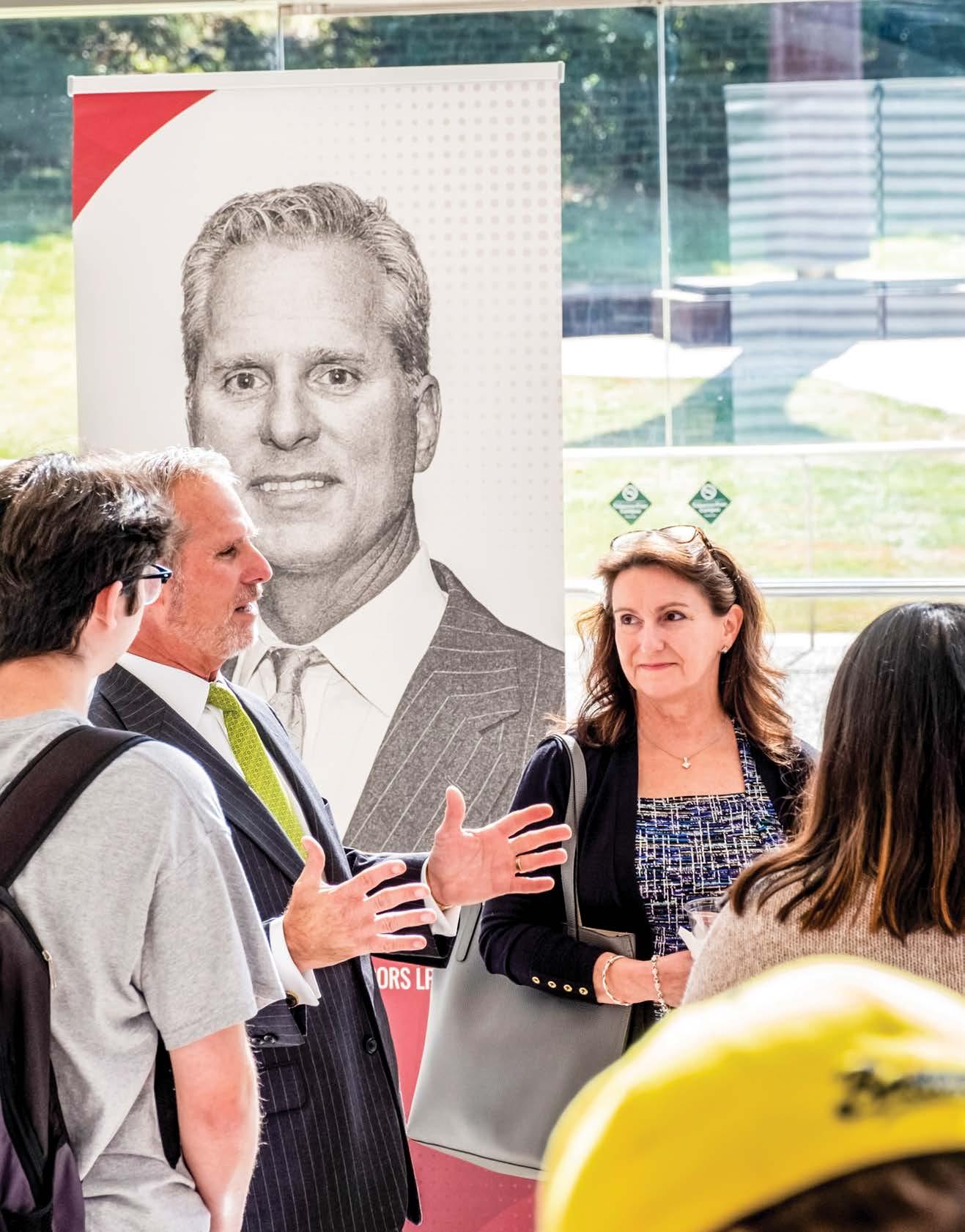
The series was conceived by Stieven and his wife, Mary, and inspired by Stieven’s relationship with his mentor, St. Louis businessman Elliott Stein, whom he regarded as a pillar of ethics. It aims to assist students in their professional and personal development. Stieven, the chairman, president and CEO of Stieven Capital Advisors, L.P., explained the roots and intention of the series to the audience.
“We thought it would be a great way to help our young students understand the importance of ethics,” Stieven said. “We want this to inspire you, letting you hear real life stories of UMSL graduates on how important ethics are to success on the road of life. And all of this, while providing you with a great chance to interact and network with these people.”
More than 100 students attended the event, which also included remarks from UMSL graduates Warner Baxter, executive chairman of Ameren; Orvin Kimbrough, chairman and CEO of Midwest BankCentre; Marcela Manjarrez, former executive vice president and chief communications officer at Centene; and Sandra Van Trease, former group president at BJC HealthCare.
The African American Alumni Chapter celebrated its

35th anniversary at the Clubhouse in Forest Park.
More than 85 alumni, friends and family took a stroll down memory lane on Dec. 11, 2022, and honored several alumni and community leaders who left their mark on the chapter, all while enjoying good food, good music and great company. Annually, the African American Alumni Chapter hosts a variety of social, educational and fundraising events that include celebrating the university’s newest graduates and honoring the legacy of former Chancellor Marguerite Ross Barnett through her scholarship.
Matthew Housewright, BSBA 2019, began a new position as a sales consultant with RNDC.
Jordan Jenkins, BS 2019, began a new position as a software engineer at GEICO.
Savitha Narendra, BS 2019, began a new position as a principal, provider strategy & contracting with Ascent Health Services.
Jennie Redel, BSEd 2019, began a new position as a multi unit store manager at Ann Inc.
Koltyn Schilly, BSBA 2019, began a new position as a senior onboarding specialist at Charles Schwab.
Tracy Smith, MEd 2019, began tenure as principal of Ross Elementary School in Parkway School District.
Emily Storey, BS 2019, MAcc 2021, began a new position as a senior consultant II at Armanino LLP.
Nicole Swanton, BS 2019, began a new position as a staff structural engineer at Burns & McDonnell.
Rayan Tahir, BSBA 2019, began a new position as a procurement specialist at Saudia Aerospace Engineering.
Samiya Tazeen, BS 2019, began a new position as a research and development specialist at Bayer.
2020s Kalynn Clinton, BBA 2020, began a new position as a TECDP lead analyst at Cigna.
Natalie Stevenson, BSAcc 2017, began a new position as a director of outsourced accounting at Prosper CPAs.
Brian Wade, BA 2017, began a new position as engagement coordinator at Cerner Corporation.
Mohammad Aljamaan, BSIS 2018, began a new position as a senior infrastructure operations engineer at Saudi Telecom Company.
Justin Collard, BSBA 2018, began a new position as a senior planning specialist at Anheuser-Busch.
Karl Guenther, MA 2018, was honored with the Drum Major Award at Christian Hospital Foundation’s Martin Luther King, Jr. Celebration.
Sibgha Mirza, BA 2018, began a new position as a software engineering analyst at Accenture Federal Services.

Katy Robertson, MBA 2018, began a new position as director of development with Arch Grants.
Rachel Tosh, BS 2018, MA 2020, began a new position as a senior accountant with Healthcare Fraud Shield.
Alisha Acosta, MSW 2019, began a new position as the associate director of quality and compliance with FamilyForward.
Christian Adams, BA 2019, began a new position as a sales agent at Spring Venture Group.
Lamar Chapman II, BLS 2019, began a new position as a customer success representative at SureCam.
Michael Dunlap, BA 2019, began a new position as an academic advisor at The University of Kansas.
Hunter Hebron, BA 2019, began a new position as principal at JTC Academy.
Breanna Colombo, BSW 2020, was promoted to volunteer manager at Make-A-Wish Missouri & Kansas.
Dylan Comparato, BA 2020, began a new position as a senior portfolio administration coordinator at Cushman & Wakefield.
Jack Cradic, BFA 2020, began a new position as an art director at Moosylvania.
Tiffany Daniels, BS 2020, began a new position as a clinical coordinator at BioTAB Healthcare. Chaddon Griesemer, BA 2020, began a new position as a senior business development representative at 360Learning.
Christy Ivory, BSW 2020, MSW 2022, began a new position as EPICC program manager at Behavioral Health Network of Greater St. Louis.
37 UMSL MAGAZINE
Over the past several months, the Office of Alumni Engagement revitalized its Dining With Tritons program connecting UMSL alumni and current students
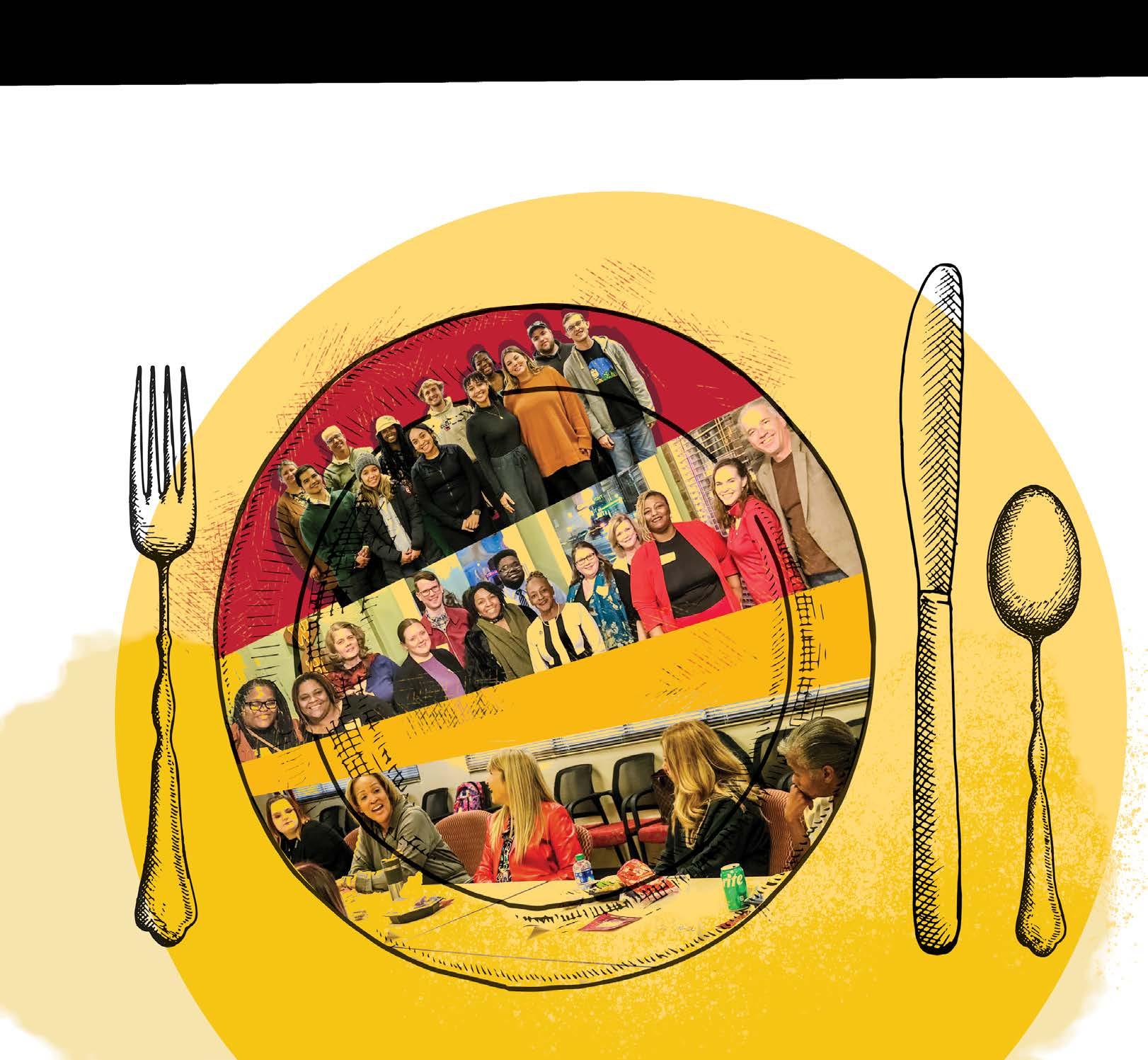
In the fall, students in Lynn Staley’s Business Writing Class met with alumni volunteers over several different dining sessions that included great conversations, sharing experiences and networking. In January, the Alumni Association Legislative Advocacy Committee hosted a Dining with Tritons at Ferguson Brewing Co. with Missouri State Representative Marlene Terry. Thanks to all the students and alumni who made these events possible. Learn more at umslalumni. org/DWT.
Eric Mossotti, BS 2020, began a new position as a sample logistics lab technician at Bayer.
Michael Nguyen, BS 2020, began a new position as a senior accountant at UHY LLP, Certified Public Accountants.
Janazell Rivers, BA 2020, began a new position as a clinical technician I at Children’s Advocacy Services of Greater St. Louis.
Dylan Siekmann, BSBA 2020, began a new position as a procurement specialist at ControlTech Automation.
Julia Spoerry, BSPPA 2020, began a new position as a commercial excellence manager at Radiometer.
Victoria Tappe, BA 2020, MSW 2022, MBA 2022, began a new position as a social worker at the U.S. Department of Veterans Affairs.
Bekzod Tolipov, BS 2020, began a new position as a data science fellow at General Assembly.
Jason (JT) Towery, BA 2020, began a new position as an enrollment advisor at Centriq Training.
Kenneth Ade, BSBA 2021, began a new position as a procurement agent - information technology & data analytics at Boeing.
Jelena Basara, MSW 2021, began a new position as a therapist at Compass Health Network.
Alexus Battle, BSBA 2021, began a new position as a contracts & pricing analyst at Boeing.
Corrine Criswell, BS 2021, was promoted to HR analyst at Emerson.
Brytaney Carr, BS 2021, started a new position as account leader at Chubb.
Joshua Carr, BS 2021, began a new position as a manufacturing engineer at Boeing Defense, Space & Security.
Derek Cuccio, MBA 2021, began a new position as a business system analyst at Charter Communications.
Gabrielle Forchee, BS 2021, began a new position as a data specialist at Premium Rental Services.
38 SPRING 2023
Morgan Foster, DNP 2021, began a new position as an adjunct faculty member at Averett University and as a psychiatric mental health nurse practitioner at REBOOT: Mind, Body, Health.
Alex Goedeker, MBA 2021, began a new position as a senior mechanical engineer at Burns & McDonnell.
Jade Johnson, BA 2021, began a new position as a manager of recruitment and admissions at Per Scholas.
Dmitriy Kornyukhov, BE 2021, began a new position as a mechanical engineer at John Harder & Co.
Alexander Kutz, BBA 2021, began a new position as the director of project management at Data Solutions Group.
Nicole Misra, MEd 2021, began a new position as a graduate research assistant at UMSL.
Kerry Moriarty, BA 2021, began a new position as the assistant director of brand development and executive assistant to the director at Terrace House STL.
Vince Pizzo, BSBA 2021, began a new position as a financial services representative at Charles Schwab.
My Legacy Family
On Feb. 25, current UMSL students gathered at the ED Collabitat to celebrate their family’s legacy with their alumni family members. The event included alumni speakers, a lunch and a special pinning ceremony where family members presented current UMSL students with a special UMSL Legacy pin.
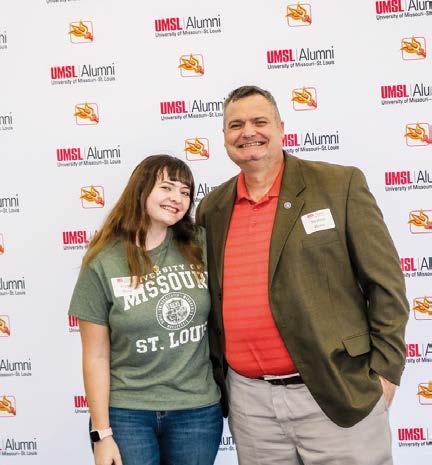

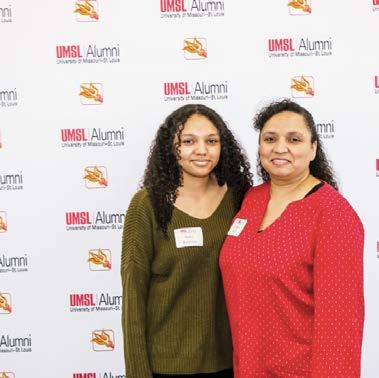
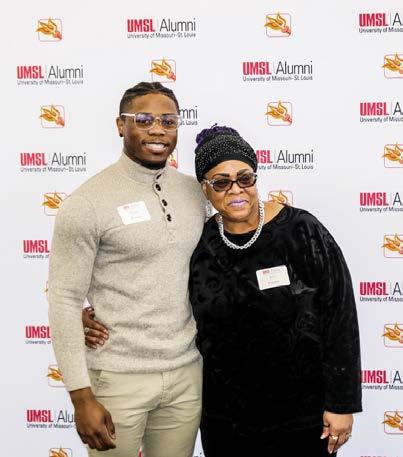

Kristina Pratt, BA 2021, began a new position as a copywriter at Drive Social Media.
Cole Prins, MSW 2021, began a new position as a success coach with the Office of Student Enrichment & Achievement at UMSL.
Briana Riley, BA 2021, started a new position as a marketing coordinator with Bluewave Technology Group.
Tyrese Robinson, BS 2021, began a new position as a teacher with the Ritenour School District.
PJ Schappert, BS 2021, began a new position as a field sales and marketing representative with Techtronic Industries.
Samantha Scott, BS 2021, began a new position as a paraprofessional at Windsor C-1 School District.
Mary Alice Swann, BS 2021, began a new position as a training and logistics coordinator at the Children’s Advocacy Services of Greater St. Louis.
Bilal Turan, MA 2021, began a new position as a data scientist at Safety National.
Monica Votaw, BA 2021, began a new position as a club event coordinator at Old Hickory Golf Club.
Kelly Weingartz, BSN 2021, began a new job as a registered nurse at Ranken Jordan Pediatric Hospital.
Stephanie Chidester, PhD 2022, was selected as a postdoctoral iCURE scholar at the National Cancer Institute.
Riahanna Davis, BA 2022, began a new position as a digital media specialist at Harris-Stowe State University.
Sam Dieynaba, BS 2022, began a new position as an administrative associate at Williams Lea.
Cara Ferchen, BASc 2022, began a new position as a tax associate at BDO USA, LLP.

Naresh Kshetri, PhD 2022, began a new position as an editorial board member/associate editor at the Journal of Digital Security and Forensics.
Leah Kuper, MSW 2022, began a new position as a loan processor-project manager coordinator at Mission: St. Louis.
Tan Nguyen, BS 2022, began a new position as a software engineer at Mastercard.

UMSL MAGAZINE 39
The UMSL Office of Alumni Engagement was thrilled to play host to its inaugural Legacy Family Lunch to wrap up Homecoming Week.
2023040.107,610.04/23.wa/mb/eh-walsworth
NOTE: INSITE Walsworth.com allisonw@umsl.edu

WendyAllison1!
Join us in realizing
a state-of-the-art library experience for the University of Missouri–St. Louis campus
Expansive student-focused study and collaboration spaces
New art gallery space to showcase the St. Louis Mercantile Library's expansive collection
New café with food and drink
Additional entrance connecting the libraries to the Quad
The renovation of the Thomas Jefferson and St. Louis Mercantile libraries on UMSL’s campus will reimagine the space to foster learning, collaboration and connections.

Help us make this vision a reality for current and future Tritons by giving to the University Libraries today!
For more information, please contact UMSL Giving.
giving@umsl.edu
giving.umsl.edu/librar yreno
of Missouri–St. Louis 60 J.C. Penney Building 1 University Blvd. St. Louis, MO 63121-4400
University
nonprofit org. U.S. postage paid St. Louis, MO permit no. 3























 From top: Steven J. Berberich, Reda Amer, Aimee Dunlap and Nathan Muchhala
From top: Steven J. Berberich, Reda Amer, Aimee Dunlap and Nathan Muchhala







 By Heather Riske
By Heather Riske


















 By Burk Krohe
By Burk Krohe














 By Timothy Wombles
By Timothy Wombles





















